RaggedEndings

Achelous and Hercules, Thomas Hart Benton, 1947
"Resolution was never anything but a dream."
We all learn early how stories are supposed to end, with loose ends all tied up, signaling resolution. The novel, once unknown and new, becomes experienced and thereby old. A few, we'll refer back to again and again, not to rediscover any ending already known, but perhaps to re-experience the style and craft of the storytelling, the satisfying phrasing and deft plotting. These stories might never properly resolve, for though we do learn that the butler did, in fact, do it, that knowledge quenches nothing, but sometimes encourages a longer, perhaps life-long engagement with this author and his prose. But that describes the book world. Out here in what passes for the real world, RaggedEndings tend to be by far the most common form of resolution, where though not completely done, one must eventually simply move on. Time and tide and all that.
The last day of Spring, just over a half of a day this year, finds me surrounded by unresolved WhatNow? Stories.
Commtroversy

"I came from The Never Can Say Goodbye Family …"
When my ninth great grandparents left England in 1637 for what would one day be called Connecticut, they broke communication with everyone not traveling with them. They spent weeks in total isolation from even land, then years before receiving any word from anyone they knew in their former home country, and then, that communication relied upon writing and paper or long-delayed word-of-mouth. Direct connection with home folks became indirect Commection, and would remain so for the rest of their long lives. No letters survive, and, indeed, letters might have never been sent, for no reliable postal service would emerge for more than a century. Messages might take months to move between what would eventually become colonies and their former home country, and not all ships safely made the crossing. Some messages were doubtlessly lost in transmission. Aside from their charter governing the terms of their obligations to their backers—for they were perhaps more capitalists than Pilgrims—they were truly on their own.
In those times, face-to-face communication fueled the vast proportion of human connections. They talked.
NDA

A votive plaque known as the Ninnion Tablet depicting elements of the Eleusinian Mysteries,
discovered in the sanctuary at Eleusis (mid-4th century BC)
"I pray that ours won't hang around for anything like a hundredth as long."
The modern organization is fundamentally indistinguishable from a cult. It perceives its secrets as its primacy, and self-importantly considers everything it does a proprietary secret. It expects employees as well as visitors to sign the cheesiest of legal documents, the holy NDA [Non Disclosure Agreement], a contract of truly questionable authority threatening severe penalties should the signer even inadvertently spill any beans. Some of these 'agreements' also insist that anything an employee or visitor utters inside automatically becomes the sole property of the proprietor without even a distant mention of compensation for that creation. These are privileged reprobates concerned first with dominion. These questionable contracts are agreements in name only, standing more accurately as coercements, my-way-or-the-highway insistences rarely open for negotiation. If a vendor, contractor, or employee doesn't like the terms, they're perfectly free to lump it. Period.
Later, when asked a straightforward question, a disgruntled ex might legally refuse to answer by claiming their speech stifled by a prior agreement.
Fatigue

Hercules Fighting Death to Save Alcestis by Frederic Lord Leighton (1869-71)
" … when Fatigue wins, everyone loses."
The front line personnel complain of Fatigue, the constant mind-numbing companion of prolonged engagement. The Fatigue enters unnoticed, while the host focuses upon tasks at hand. Standing back, though, a wave of exhaustion washes over, astounding. How could I not have noticed? Fatigue brings no excuses, though, for even more of the same awaits and relievers seem just as scarce as does time. Diving back into the fray, distinctions like night and day lose meaning. Like an engine, one seems to run much longer on empty than when nearer full. A definite pull discourages disengagement. Beyond tired, fresh space appears where energy and fear forfeit their former influence. One becomes a machine repeating practiced motion and preconscious skill. Someone's likely to have to pull you off your work. Only then might real weariness settle in.
Doctors, nurses, and EMTs know Fatigue better than do you and I.
FourHoles
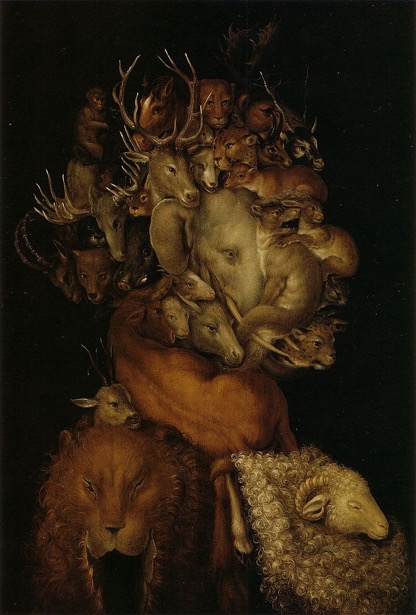
Earth, Giuseppe Arcimboldo, possibly 1566
"It might not say anything about me or my overblown prowess …"
The oldest political advice counsels that if your opponent's busy digging a hole, stand aside, but what to do when you catch yourself digging one, or, as in my case, find myself engaged in digging four holes? I imagined each a modest effort, though I knew the substrate beneath that flowerbed. I was building a defense against the bastard deer, who, around here, put self-respecting omnivores to certain shame, for they eat anything, everything, even prickly gooseberry shrubs and rhubarb leaves, which by international decree have been recognized as deadly poisonous to all species since at least the early Middle Ages. I'd moved my circular wire fence from my rhubarb bed to enclose the gooseberry garden after The Muse had spotted the expletive deer gnawing my beleaguered bushes, thinking that now that the rhubarb's well established and lush, the deer wouldn't be in any rush to assault it this year. Once I'd moved the barrier fence, the deer mounted armed assaults against the rhubarb, stripping every leaf from every stalk, gratefully avoiding the edible stalks, which The Muse made into a custard pie, but the damage was done. I'd need a better barrier for the gooseberries once I moved the rhubarb's original protective fence back where it apparently belongs.
Hence, the holes.
ShelfControl
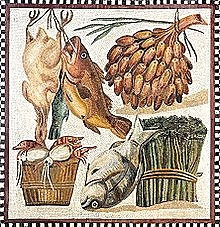
Still life on a 2nd-century mosaic, with fish, poultry, dates and vegetables from the Vatican museum
"A decent pot of beans will last through a week of breakfasts and lunches if you're not too picky."
Three months ago, when the stay-at-home directives hit, you could be excused if you thought that few people had ever put much thought into the idea of maintaining a pantry. City dwellers have always struggled with shortages of shelf space counterbalanced with a choice of corner bodegas and convenient restaurants. Country dwellers have always maintained some cellar space for what they euphemistically referred to as canned goods, and many maintained more than one refrigerator and even a supplemental freezer or two or three to sustain a sense of self-sufficiency. When it's ten or more miles to the nearest store, an inconvenience market primarily selling gasoline, one quite naturally stockpiles and makes do. The professional class tended to eat out more frequently, daily lunches and a couple of suppers out each week, while the working class might have more frequently brought their own bag lunch and made their own suppers at home, often after a quick stop for that evening's ingredients on the way back.
But the stay-at-home directives disrupted these rhythms, forcing folks to suddenly attend to more than than just the meal before them.
Ministration
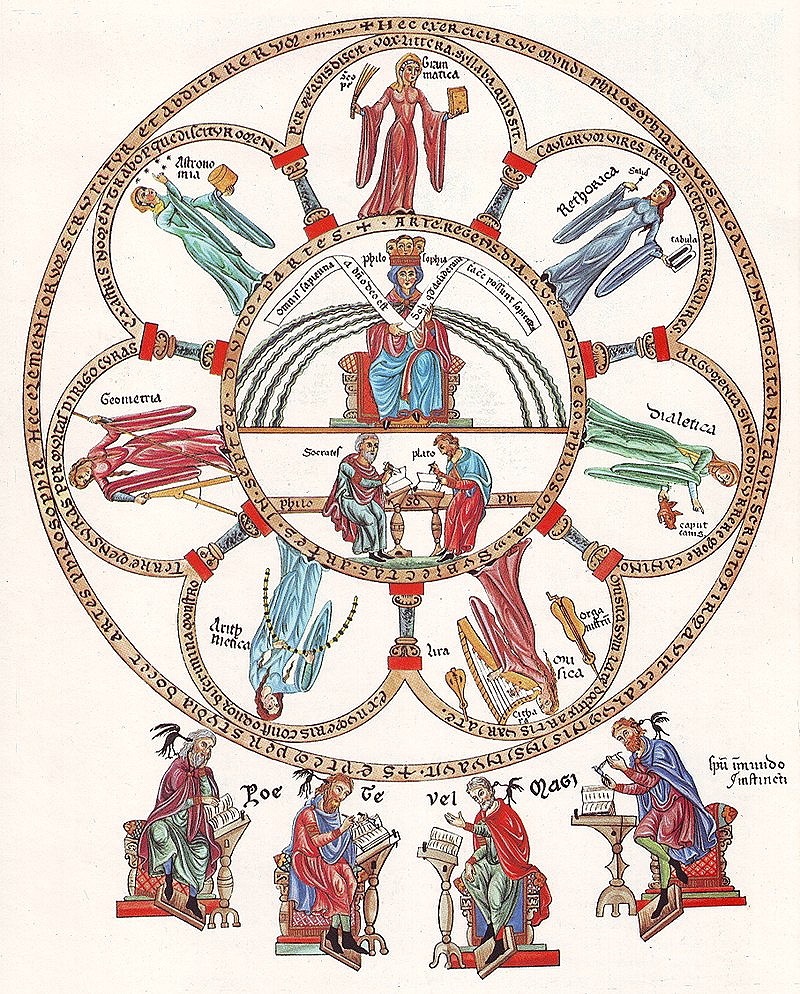
Philosophia et septem artes liberales, the seven liberal arts.
From the Hortus deliciarum of Herrad of Landsberg (12th century)
"When a leader pisses off their bureaucracy's Old Marys, they're posing for their own statuary; they're finished."
History seems inscribed with leaders' footprints, it's all Napoleon this and Hannibal that without properly acknowledging those who greased the gears of great revolution and, more significantly, the Pax Romanas separating upheavals. Those gear greasers came from the ranks of competent ministers, folks well out of history's limelight who designed, constructed, and maintained the vast bureaucracies which competently administered societies. We find no statuary commemorating the savvy minister, no steeples erected in fond memory of the geeks who broke only paper trails, no continents named after the genius who invented double-entry bookkeeping, but without them the touted leaders could not possibly have succeeded at anything. In our present time, with pandemic sweeping the globe, the scrupulous statisticians and hospital administrators have contributed more to containing the contagion than all the leaders proclaiming impotent dominion over it. Send me one Old Mary and I'll comfortably replace a Pentagon filled with Five Stars and a carrier fleet of sailors.
Back when The Muse worked in the property/casualty insurance industry, she interacted with many brokers and home office executives, but largely via their support staff, who typically reported to a matronly secretary who actually ran the operation, a role one broker referred to as "his Old Mary."
InappropriateMetaphor
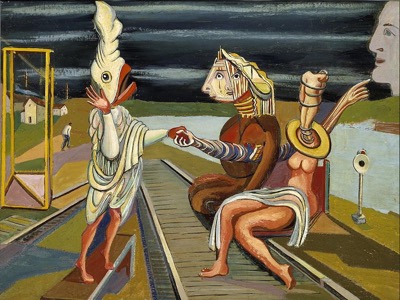
The Solidity of the Road to Metaphor and Memory, Misha Reznikoff, 1934
"Suffering might always be the lingering effect of innocently ineffective metaphoring."
InappropriateMetaphor is the root of all evil. It enables us to perceive difference where no meaningful difference exists. It ties us to self-destructive habits, encourages international conflicts, and might convince someone to build ineffective border walls. It fuels global warming, redlining, and urban blight. It encourages disposables which last for centuries. It fuels fear and institutionalizes ignorance. It justifies dominance when cooperation would better serve. It promotes tenacious inequality and bigotry, poverty and great wealth, debilitating sickness and declining health. It makes us crazy while passing for perfectly sane. It represents manners of living as if they were necessary imperatives. It poorly informs us.
Shifting metaphors might mend anything.
AsymptomaticSuperspreader

"Our walking shoes might finally be ready next Tuesday …"
I have come to presume that all people not wearing a mask in public are undiagnosed AsymptomaticSuperspreaders. I wear my mask to encumber my natural tendency toward AsymptomaticSuperspreading. Since I cannot definitively determine whether I'm carrying, I figure that we're all safer if I presume myself to be a dangerous presence. I know that I feel a whole lot safer when others presume the same about themselves. Sure, there's a chance that I won't immediately infect you if I don't wear my mask, but there's essentially zero chance if I do, so I take it upon myself to protect you. You're welcome. I do wonder why you don't feel compelled to protect me in return. Maybe you believe yourself not to be an AsymptomaticSuperspreader. This belief best preserves your innate ability to become one. Congratulations!
The Muse ordered the breakfast burritos the night before for pick-up at nine the following morning.
Breakout
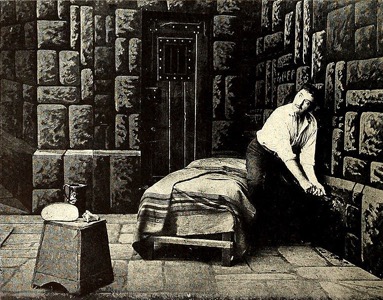
Film still of James O'Neill as Edmond Dantès in The Count of Monte Cristo, a 1913 film.
"I've decided to escape."
I've managed to master about ten percent of a writer's craft in that I seem to be able to write. Raw writing, though, might amount to no more than ten percent of the craft, the other ninety percent being related to all that happens after the writing's done. Editing's in that ninety percent, but so are all the activities related to distribution: promotion, publication, and, I suppose, personality, wherein the writer projects a more pubic persona. Simply writing's a fine occupation, though it pays no bills and without some broader distribution, realizes little reach and influences few; not that writing's only justified if it influences, for it's possible to restrict a writer's work to only influence the writer or just a few close acquaintances, but a broader presence seems essential to fulfilling a writer's potential. Writing's a share the wealth sort of enterprise.
Approaching, let alone mastering writing's tail end ninety percent has always been my dread, one of those activities I wouldn't mind having done, but seem to have no passion for actually doing.
Timemorelessness
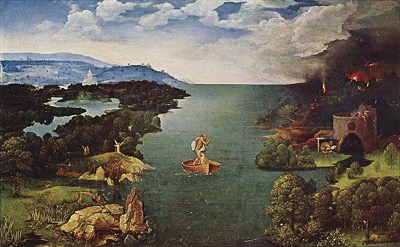
Joachim Patinir: Landscape with Charon Crossing the Styx, 1515-1524
" … we'll claim to have been there then without actually having understood anything."
We usually define time as finite, a steadily regulating entity, drawing the baseline cadence of our lives, at least in ordinary times. But we live in extraordinary times, beneficiaries of that ancient Chinese curse, so our time proceeds much more erratically. Some days constrain every effort while others seem to expand before us like a vast ocean stretching far beyond the visible or even any imaginable horizon, essentially black holes absorbing every expectation. I cannot fill these immense days, which expand time into unexpendable excess to produce the opposite of feelings of being pressed for time. Time moves languidly then, without harassing drop dead deadlines, hardly seeming like time at all. A Timemorelessness settles in, not needing management or optimization, for it seems an infinite good aching to be what more constraining times might insist upon labeling wasted, but one cannot waste Timemorelessness, like one cannot ever squander any infinite, for expending any portion of it seems to reduce the remaining only insignificantly.
I become a time Midas those days, where everything I touch turns into even more potential, rendering closure meaningless.
Esteem-ating

Study for Nymphs Finding the Head of Orpheus, John William Waterhouse, 1900
" … and not peer darkly into any glass."
We tend to peer into the glass brightly, always perceiving better ahead. Our self-esteem seems to rely upon this curious facility, as if darker visions might utterly destroy us. Those who project more pessimistically attract few followers, for they seem simply grumbly, suffering from some form of depressive disorder. Speaking truth to power first requires speaking truth to one's self, and few selves seem very interested in anything like the truth. We want the princess to marry the prince, which recently transformed from a toad, and live happily ever after because we'd prefer to live happily ever after, too. We first seek reassurance. The depths of deflecting denial seem just as infinite as the heights of our hopefulness. A No-Man's Land stands between these defensive barricades.
In mid-April, the US suffered the equivalent of a D-Day invasion's number of dead every two days, an unimaginable volume, even in retrospect.
Poelease
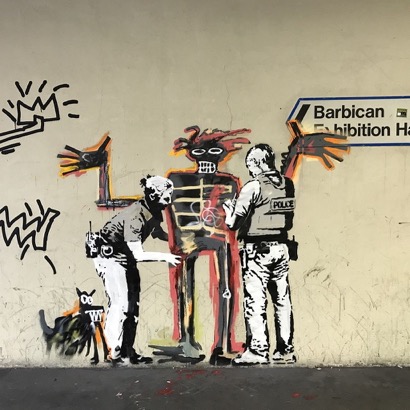
Basquiat being “stopped-and-frisked” outside the Barbican Centre, Banksy, 2017
"I still fully expect to be harassed if not arrested with every encounter …"
Every child of the sixties learned to distrust the cops. We were at constant risk of arrest, whether from simple possession or even simpler teenage passion, the cops seen as at best spoil sports and at worst voyeurs and vindictives. We maintained vigilance, a practice which left some life-long paranoids. We'd each seen plenty of swaggering cops playing the tough guy but only very rarely encountered a compassionate one. We each expected to be run in for some inadvertent infraction before we'd graduated high school, as we practiced a clandestine, fatalistic form of civil disobedience as a simple matter of existence. We weren't bad kids, but we were at continual risk of arrest, prosecution, and incarceration. These experiences formed a conviction that the Poelease were not, as Jack Web's Dragnet insisted, present "to protect and serve," but to harass and punish, an occupying force representing the forces of hypocritical Republicans. It mattered who you knew.
A friend and I were once arrested for the presumed crime of wading in a park fountain we'd both been wading in since we were small children, the arresting officer impatiently explaining that only little kids were supposed to wade in it.
Longhair

Samson and Delilah, by Gustave Doré, c. 1860
"I'll recognize ordinary time when I see it looking back at me from my mirror again."
Since the age of twenty-five, my head has served as my chronometer, its finest granularity being the month, roughly the distance between haircuts. My face accurately measures time in days. My mustache, in fortnights, the time between necessary trims. Before the shutdown, I remained groomed as regularly as any clock works. Since, even my shaving's slipped to every other morning, often every third or even a previously thinkable fourth. My hair's gone feral, over my ears and curling along the back. I feel on track to return to my early twenties' self, frizzy pony tail dangling halfway down my back, tied behind my head with a thin rawhide strap. I for years contended that I carried the Sampson gene. Any deceitful Deliah carrying scissors could thwart my power, such as it was. I long lusted after long hair and maintained it with a reverence exceeding religious conviction. I didn't just have long hair or wear my hair long, I WAS a longhair.
Being a longhair qualified as an identity then, a Good Housekeeping Seal of Approval of a certified Age Of Aquarian within.
RecoveringGuru

Adi Shankara with Disciples, by Raja Ravi Varma (1904)
"I make my own noise without hoping to change anyone's world but mine."
Looking at me now, you might never imagine that I was once considered to be a guru of sorts, for I was a designated thought leader and workshop teacher, and the guru designation just seems to come with that territory. As a veteran of the sixties coffeehouse music culture, I was certainly no stranger to the stage. I would balance on the three-legged high stool on the platform overlooking the place and perform my latest song to the largely distracted assembly, hoping to catch an eye, praying to be recognized, just as has every other budding singer/songwriter in the history of the world so far. That stage was never subsequently swarmed by entranced females, but I'd usually gain a heart-felt appreciation or two. Once I started consulting and teaching for real, the relationships became increasingly curious. Because I had been present, holding forth, personal insights participants experienced might end up somehow attributed to me, as if I had induced them, and maybe I had. Heartfelt appreciations sometimes became indistinguishable from veiled seductions. I was largely unaware, though home life could get complicated by a curious voicemail left for me but picked up by my spouse. Then some explaining would commence.
The cult of celebrity, even of local notoriety, did not reassure me.
ImaginaryEnemies

Crítica, engraving by Julio Ruelas, ca. 1907
" … hope springs intermittently, never seamlessly or continuously."
As society seems to crumble, live on the six o'clock news, I feel mostly moved to tap the snooze alarm. The broadcasts seem to need to cast their full color video in shadowy blacks and whites, a palette hardly suitable for representing any underlying complexity. It seems to be us versus them again in never-ending conflict. The simplicity imbedded within the storyline unfamiliar to anyone experienced in any sort of real world relationship. These seem soap opera representations, where human relations distill down to the color of a character's hat and the soundtrack's sinister tone. We each maintain our caricature characterizations of those we imagine to be our mortal enemies, mostly without ever having had the pleasure of their physical company. We remain willfully ignorant of others' intentions, if only because our fictions might prove unbelievable should they stray too far into self-contradiction. We hate more easily than we love, often holding ourselves hostage awaiting another's extension of an appreciation we ourselves withhold. There might well be far fewer bad actors than really bad plays, lines proposed to maintain a seemingly necessary simplicity, lest we grow too confused.
I watched a poorly masked so-called protestor paint graffiti on an innocently by-standing tree in the park adjacent to the statehouse this week.
Cascade

Destruction of the Tower of Babel by Crispijn de Passe the Elder Netherlandish, 1612:
at right men and women flee from the burning tower, at left men and women raise their hands toward two flying angels,
from a series of engravings made for the first edition of the 'Liber Genesis'
"Once prosperous farmers, they moved into a crooked little house in town to live out their days after the Cascade."
The great Cascade has already started, though the full flood has yet to reach many. Starbucks has requested twelve months of rent 'consideration' after not paying rents for the prior two months. Nearly half of the commercial enterprises in this country missed rent payments in April and May, and we're still in very early stages of this particular pandemic. This sort of situation marks only the beginning of a cascade of shortfalls, where landlords, mortgage holders, and property managers start to lose their usual inflows of cash. Insurances and other services follow soon after, with nothing left to even pay the cleaning staff and the garbage men. A building can go derelict after a few remarkably short months. The blood extraction units take over half the turnip patches as the lawyers get involved.
Prosperity has yet to be shown to trickle down, but austerity certainly does, though its trickle easily becomes a Cascade. It also trickles up.
Thinnest
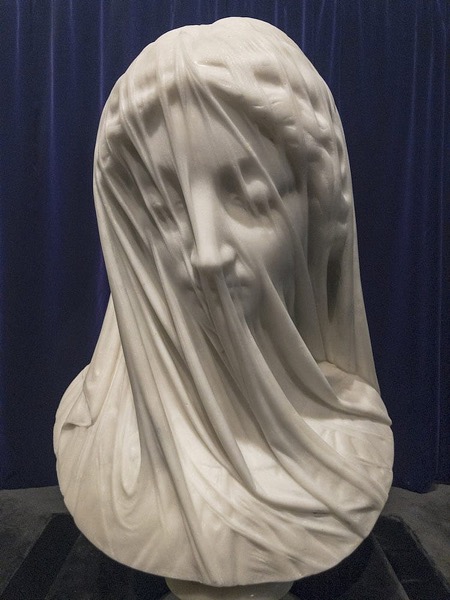
"The Veiled Virgin,” Giovanni Strazza, ca. 1850s
"We inhabit a poor country, one whitewashed over blistered base coat."
Read any history of These United States and you'll learn that we've never been quite as united as we publicly purported ourselves to be. We project our stories out onto a frequently disbelieving world, for the world often sees right through our veil to perceive the underlying dishonesty and naiveté. We believe, after a fashion, though that fashion seems the very Thinnest imaginable fabric. We've mostly preferred to look good over doing genuine good, with self-interest a frequent companion. The recovery from the 2008 market crash produced a predictably thin result, with the bulk of the recovery focused upon repairing the veil, producing another remarkably thin result; perhaps the Thinnest ever. Employment rose to record levels, but so did the number of absolute bullshit jobs and scutty gig work, usually without benefits, providing only a distant appearance of prosperity. A puff of adverse breeze quickly brought down to their knees those inhabiting that house of cards.
Our pandemic defenses, too, were cardboard constructions, long starved of resources in favor of flashier uses.
ThePandemicParadox

Rage, Flower Thrower, by Banksy, painted on a wall of a gas station in the West Bank city of Bethlehem, Palestine
"Even the most powerful people on this planet cannot influence the velocity of fate."
This Pandemic seems to have promoted paradox into fresh prominence. Paradoxes shred conventional problem-solving by presenting conditions not immediately conducive to understanding or resolution. They remain mysterious and above all tricky. This one does not crisply respond to even the more well-intended interventions. Our scientists seem uncommonly wise for initially prescribing strategic retreat. Politicians predictably embraced full frontal assaults, if only to preserve the useful fiction that they were in charge, a strategy doomed to fail. The more powerful you pretend to be against a pandemic, the weaker you eventually seem. Scream all you want, offensive speech and derisive action will not succeed. Conquering paradoxes demands a certain subtlety.
Responding to any emergency with patient inquiry seems so counter-intuitive as to feel like most certainly the wrong approach.
Bookish
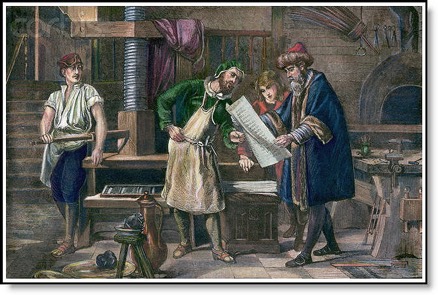
Gutenberg: Colored engraving created in about the 19th century. Artist unknown. Source: Bettman-Corbis reproductions
"I never feel wealthier than when I'm carrying a fresh pile of found books out the front portal of my local library."
I identify as Bookish in the same way that some identify as Jewish. This seems largely a genetic inheritance combined with a cultural tradition. Bookishness carries deep obligation along with certain evolving rituals, tradition compounded through diligent practice. My shelves overflow with treasured artifacts, reminders of theres and thens, wheres and whens from my past. My social and spiritual evolution seems catalogued in my library, each volume a memory of a specific place in time, most holding some residue of satisfaction or insight, though I retain a few there out of possible spite, for I have through books maintained an inner dialogue, a dialectic inquiry into the vast variety and novelty of this life, little of which I feel properly positioned to personally experience. I've despised some of this. My library and my much broader catalogue came to more than merely inform me, but to define who I've come to become. My education ongoing, settling little to nothing, yet the dialogue/monologue continues.
I read much more than I write, and might most properly identify myself more as a reader than as a writer, though few accept reader as an identity or a profession, for it pays nothing but dividends, no cash incomes.
Relentless

Hope by George Frederic Watts, 1886
This image shows a lone blindfolded female figure sitting on a globe, playing a lyre that has only a single string remaining.
"This relentless siphon started defying simple gravity long ago …"
My hop vine, grown seven feet in a few short weeks, sparked my insight. I've come to think of it as my Hope Vine. I'd been reveling in spring, the great respite from winter's ravages, and wondering what I was witnessing, for this fresh season's beneficence seemed … what? … oh yea, Relentless. There has been no stopping it. A crashing hail storm pock-marked a few of the more delicate leaves and blossoms, but the expansion continued in earnest the following morning. The seeds I sowed without really knowing what they might become quickly sprouted and not even the neighbor cat using their planter for his bathroom discouraged their attempted dominion. Even the chokecherry, blighted as it seems, threw out fresh branches and suckers. Not even the endless-seeming setbacks through winter seem like barriers now, for I know how their progression turned out, or at least how it's turned out so far. A clear expansion relentlessly continues, with seemingly ever greater passion, no obvious end in sight.
We inhabit a tenaciously positive feedback loop where nothing seems capable of slowing or turning forward momentum.
Opacity

The Blue Kimono by Chase William Merritt, 1888
" … we must believe in something much more than nothing to amount to anything worth anything in this world."
Nobody usefully argues for full transparency because nobody really wants to see my kimono flapping open from neck to knee. A useful level of Opacity seems necessary to maintain civility, though nobody walks around wearing an impenetrable brick wall or black box. We quite properly keep our kimonos firmly belted to maintain a certain dignity, though we well understand that as a result not everything's on display. Fantasy fills in what fabric conceals, and those fantasies reveal perhaps more than any flapping open kimono ever could. Hopes and wishes, fears and dreads complete the presentation, imagination always insisting upon ever more disclosure. A delicate balance maintains decency between cleavage and knees, and not every observer seems all that pleased whatever that balance might reveal.
Any relationship predicated upon a presumption of full disclosure seems doomed from its start because only a part of anyone's impressions ever become fit for any other human's consumption
Anticiplaytion
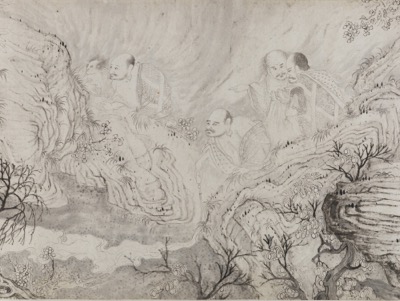
The Sixteen Luohans by Shitao (Zhu Ruoji), 1667
" … a post-graduate course in more warmly anticipating …"
It seems as though my days used to follow a certain cadence, each inducing its own rhythm. Mondays, I'd tidy up the place. Alternate Tuesdays would find me sorting recyclables. Wednesdays, I'd stop by the library. Thursdays, I'd shop to avoid the Friday crush. Fridays, I'd poke around in the yard. Saturdays and Sundays would bring a Farmers' Market excursion or two, extreme larder-stocking, and unrushed suppers with hot jazz beating in the background. Then the radio station cancelled the hot jazz program in favor of talking heads. We filled in with RadioDeluxe, a fine production but clearly lacking in Bix Beiderbecke tracks. Winter intervened to leave us snowbound. We were gone for a couple of weeks, returning with spring to be sequestered in place, snowbound without snow, no place to go. The Farmers' Markets didn't open this spring. Alternate Tuesdays still find me sorting recyclables, but the rest of my anticipations have gone arrhythmic. I can't coherently anticipate right now.
I imagine this condition a real world test of a long-considered situation.
Imprecision

Gerhard Richter: Frau Marlow, 1964
" … revealing perhaps more than any of us care to recognize about reality and truth."
Back before the pandemic, when I could sometimes go out for morning coffee, the waitperson would often respond to my order by saying, "Perfect," as if we'd managed to achieve perfection together. I'd order my usual large (not Grande, thank you, or Venti … we are not in Italy and even in Italy, I chronically forget the proper word) decaf in a china cup and receive a "Perfect" in return. I'd noticed that this response had become common, so I was never surprised or shocked, but I remained curious about how such precision had entered into the most common of all transactions. It was "Perfect" here, "Perfect" there, and "Prefect" pretty nearly everywhere, while in what passes for real life, in ordinary times, perfection remained as it always had, slightly rarer than hen's teeth.
I figured that we might have forgotten how rare perfection always was and continues to be, as production values have exponentially increased.
I'mWithStoopid

"Keying Up" – The Court Jester by William Merritt Chase, 1875
"I might never know what to say to any unmasked anyone."
I asked The Muse what I might say to someone not wearing a mask in public. She responded by reporting that she'd been considering just carrying around a few of her homemades, so she could generously offer them one, on the presumption that they might not own one. I thought that a fine strategy, though I notice that she hasn't yet started offering anyone this sort of assistance. Judging from the apparent belligerence of those choosing not to wear masks, her offer seems unlikely to attract many takers, though just one might reform my pessimism. I failed to convince my grand niece that two hundred thousand empirical observations might reasonably suggest that a medication might not prevent or cure Covid-19, but she insisted that the findings might have influenced her had they come from double blind testing, the very sort impossible to perform during an actual pandemic. She was married to her perspective. The more I argued counter to her preconceptions, the stupider I seemed to become in her eyes. Stupid in anyone's eyes renders impossible any seeing eye to eye.
Even a casual observer can't help but notice that our world seems filled with utter stupidity.
Eigenvaluing

"Together, we might not get anywhere but where we always go and where we seem to belong, anyway."
Each relationship seems to resolve to a certain eigenvalue, a self-similar resolution. When a relationship becomes dominated by a single personality, a Me Me Me Me Me Relationship, it resolves to an eigenvalue of one, reputed to be the loneliest number. Other relationships seem to reliably reproduce certain shapes, the triangle being one of the more common. In these, every issue seems to have three sides, like when a mother-in-law seems to get involved in every decision, the two principals might struggle to find unaided resolutions. Families quite pre-consciously replicate reliably similar shapes, some deeply influenced by a forceful father or a tenaciously unruly child. Whenever they engage, they seem to play to the same stymie. Some relationships reliably replicate dissatisfaction while others produce great delight. It's a great mystery why relationships behave in this way, but they certainly seem to eventually project certain predictable outcomes upon themselves. Some seem especially blessed and others, unusually cursed, reliably fractal, each in their own unique way.
Those trying to shape this charge, this strangely-attracting force, often simply make matters worse, adopting one after another seemingly inevitably failing improvement strategy.
Anniverstory
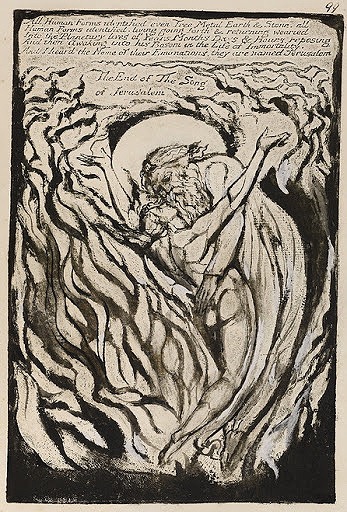
The End of the Song of Jerusalem, William Blake, 1827
" … what actually came to pass one day but never, ever went away."
The crabapple trees were in full and glorious bloom. The iris bed across the front had just begun showing color. The house, still white with garish blue window trim in those days before I'd stripped it to bare wood to repaint it caperberry green. The rose garden and the spreading, ancient apricot were still in their more primitive forms, time's ravages yet before them. Family and friends gathered to witness The Muse and I marrying. We'd planned a fitting celebration with fairy lights strung in trees and all along the arbor over the back deck. James flew over from Seattle to serve as our chef. We bought Copper River Sockeye filets and huge bags of fresh-cut asparagus and enough strawberries to more than feed the multitude. The Muse's Aunt Lillian tottered around the yard, leaning over her walker to pull errant weeds. Everyone who attended accepted an assignment to do something, for this would be a Do It All By Ourselves affair.
The preacher drove over from Beaverton with his partner, both heavily tattooed and pierced. The Muse's siblings and cousins came vast distances to join the celebration.
Unmasking
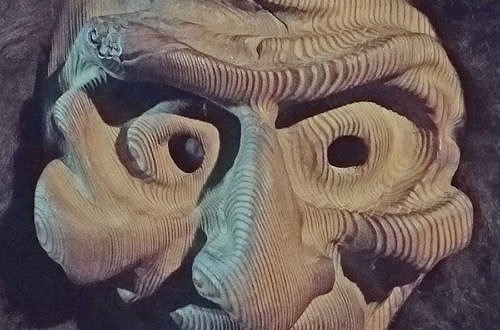
"Clothes make up the man more than make him."
Writing this morning, New York Times columnist Maureen Dowd commented on Our President's mask peccadillo, how his refusal to wear the mask his administration prescribes unmasks him and how his insistence upon constantly projecting a public personna has left him without evident personal identity. Nobody has a clue who he might really be beneath his masking exterior, which leaves him a definite minority in a society increasingly identifying itself as dedicated mask wearers. Our new masks don't so much cloak as identify who's careful and who's careless, who's courteous and who's contemptuous, who's comfortable demonstrating their vulnerability and who's in reckless denial. Curiously, as Dowd notes, our great masking seems to have unmasked who we more authentically are, with those too awfully invested in playing dress up suddenly relegated a lower social standing.
The America I grew up in performed like a continuous carnival with each in the costume commensurate to their role.
QueuingUp

"I foresee a day when meat might become, for a time, flavoring more than centerpiece entree …"
I really should have paid closer attention through Junior High, for I contend that every life lesson worth learning was woven into that experience, few of them during actual classes. Those years now seem as though they were a perfectly crafted passion play, a junior soap opera with every archetypal character present. Lunchtime seemed especially rich. Each clique would congregate around their table, territorial and exclusive. The sack lunchers segregated from those rich enough to cough up the thirty-five cents for a hot meal. Whatever the class, everyone ended up QueuingUp, waiting 'on' or 'in' line for something. Americans have never been naturally skilled at QueuingUp. Where I come from, line standing was for foreign cultures and big city people. Us small city people might line up for a football game or Forth Of July fireworks, but our daily lives rarely required us to wait for anything. Our heritage seemed to be instant gratification, except for the excruciatingly slow queue in the junior high school lunch room.
The pandemic has popularized QueuingUp like I've never seen.
WeightingHeavily
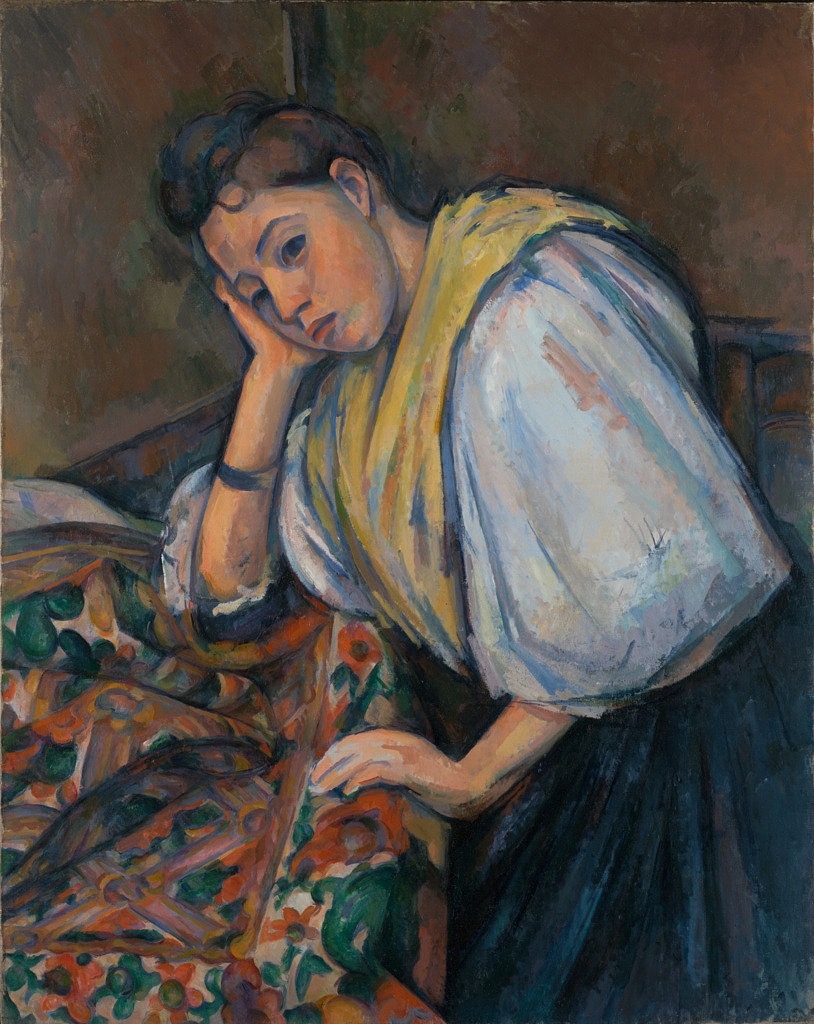
Paul Cézanne, Young Italian Woman at a Table, about 1895–1900
"Pandemics progress by such insignificant increments …"
I imagine myself trapped in a waiting room with time weighing heavily upon my soul, no real place to go, Weighting. C. S. Lewis might have imagined this place, every seat as hard as an old bench and none comfortable. I stand beside my possessions, which I've stuffed into an oddly-shaped knapsack, which seems a tad too heavy and awkward to handle. I'm weary of standing and cannot quite bring myself to sit. I want to wander over toward the newsstand, but I'd have to drag my knapsack along and I cannot quite face that chore. Besides, I know what I'll find at the newsstand: stale candy I wouldn't choose to buy if it was fresh, yesterday's headlines posing as news, a haze of cheap cigar smoke ringing the place. My train (or will it be a bus?) would be running way late if it was running on anything like a schedule. My destination unknowable, departure time up in the air, I could be waiting anywhere, but I seem to be Weighting nowhere at all.
I spent much of this writing week deferring, missing even my own meager deadlines.
NoPlaceToChide
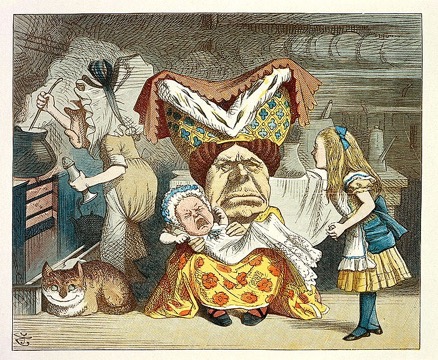
Illustration from The Nursery "Alice", from John Tenniel's illustrations to "Alice's Adventures in Wonderland," 1890
"I am neither my neighbor's critic nor her champion."
Have you noticed that The Chattering Class has lost its class? No longer does mere difference of perspective divide us and discourse hold promise. Public derision widens our divisions, encouraging them, rendering unthinkable even civilly agreeing to disagree. Daring to speak my mind might find me publicly derided as a fully fledged Enemy of the State, arriving far too late for any hope of receiving redemption. "Off with her head," some social media Red Queen says, and headhunters appear to jeer and shout down. Can anyone dishonorably defend their honor? I find myself wondering, "Who stole your trike?", for the spite seems inborn, a carefully nurtured identity, a grand and glorious begrudgement of the first degree. Taking offense seems no longer offensive, but an anticipated if overly-defensive response. A simple question seems likely to bring brimstone down upon the questioner and a curious social standing upon the devil delivering it. Dogs eat dogs and pups routinely eat puppies now, every issue a dogfight to the death.
The death of civil discourse arrived on little cat's feet, greeting us as warmly as might any savior.
IllAtEase
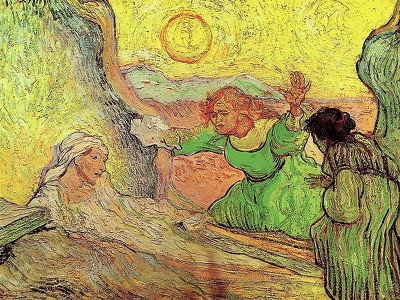
The Raising of Lazarus after Rembrandt by Vincent van Gogh (1890).
" … having apparently traded in my innate senses for a double handful of IllAtEase."
This pandemic provides uneasy respite. The Muse suggests that we're better off if we just assume that we're infected and throwing off virus like one of those hose-tracking garden sprinklers. I imagine that everyone I encounter's doing likewise and that I'm not successfully dodging their bullets, so I slather sanitizer before and after every excursion. An ancient adage insisted that a dream come true amounts to the most insidious punishment, and the now interminable pandemic seems the perfect foil for any former aspiration to spend more leisure time with family. Time moves most slowly when held under this kind of lock and key, where nothing physically inhibits me, but where a certain moral sense suspends me in place. I do the right thing without the expected consequent feeling very good about my choice. Nobody notices my generous absences and nobody rejoices over my tacit contributions. The Muse wonders where I've gone and I respond by asking where in this constraining space I might feel safe to manifest. I feel distinctly IllAtEase.
Sleep produces no rest, but seems to encourage an ever-deepening restlessness; a Lazarus death.
NumberPunching
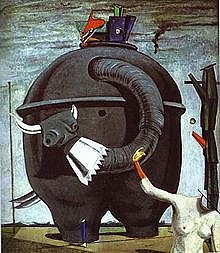
The Elephant Celebes, Max Ernst, 1921
" … at least one piñata short of a party."
Covid-19 case counts suggest whatever the watchman damned well wants them to suggest. Raw numbers seem to be inconsistently reported due to a near absence of testing. Some officials seriously support sponsoring fewer tests, since increased testing just seems to inflate the case numbers. Some firms and localities refuse to even discuss test results, insisting that they're thereby providing an important public service by preventing panic among people who might not properly interpret findings. One governor of an early-opening state has repeatedly privately apologized for releasing, with considerable fanfare, data which only showed a reduction of new cases because of what he later quietly referred to as "sorting errors." Who sorts data so that April follows May? Multiple times? NumberPunchers do.
A NumberPuncher professionally muddies waters.
Crow-Ding
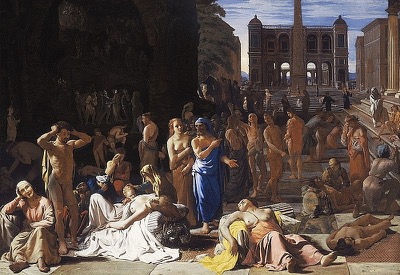
Plague in an Ancient City, Michiel Sweerts, c. 1652–1654
"I'm no more ready to return to what passed for normal than I was prepared to inhabit that normal when it was here before."
If we refer to a crowd of crows as a 'murder,' a crowd of HomeDespot shoppers might reasonably be referred to as a 'suicide' of shoppers, for the context seems to insist upon a shopper's acceptance of suicidal risk as the price of entry. The door monitor, outfitted in fetching blaze orange vest and weary-looking face mask, turns back no-one, but seems posted as a public genuflection to a government recommendation and not as any serious enforcement. The aisles might be marked with fresh masking tape arrows which no more than vaguely hint at a form of traffic control, but I don't know the layout well enough to understand how to get where I'm going should I follow their subtle advice. I don't even notice their presence until I'm halfway there and the side aisle seems to have been blocked off for some lift truck work. I'm stuck however I go. By the grace of one of the genuinely lesser gods, I find what I came looking for, but I abandon whatever hope I carried in with me when I see fresh chaos at the checkout stands, with unruly aisles-full of overfilled carts and impatient customers. I return my prospective purchases back to the shelf display from whence they came, wheedling my way past clutches of husband and wife tag teams leisurely blocking my way, and exit the store to slather my hands in sanitizer and slink back home. I should have known better than to have ever entered there, me and my surviving hope to find better.
My history with crowds and consequent Crow-Ding (that warning klaxon sounding in my head whenever entering a crowd) informs my relationship with them now.
RustySpring
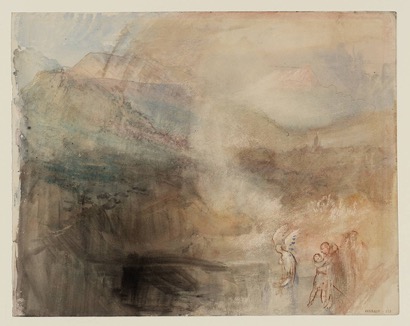
Joseph Mallord William Turner, The Angel Troubling the Pool, c.1845
'Now there is at Jerusalem by the sheep market a pool, which is called in the Hebrew tongue Bethesda, having five porches. In these lay a great multitude of impotent folk, of blind, halt, withered; waiting for the movement of the water. For an angel went down at a certain season into the pool, and troubled the water; whosoever then first after the troubling of the water stepped in was made whole of whatsoever disease he had.' John 5.2-4
" … in need of an angel or two to trouble overlong-still waters."
Spring finally arrived after six full months of winter. Through the short days and the early lengthening ones, I survived on my usual time-worn fantasy, that if I was not snowed in, I would be out in my garden, on my knees, praising all creation, troubling dirt. I fondly fantasized about really taking control of my landscaping, culling rocks and loosening soil until the yard looked like a Sunset® Magazine cover. Once spring came, though, I watched myself milling around the periphery of the pool awaiting the arrival of an angel, I suppose, as if I needed permission to begin. I thought the season a false one at first, distrusting the prankster weather, disbelieving that the snows had actually passed, even after the snowbank melted into nothing more threatening than ground moisture. I'd all winter imagined myself simply springing back after hibernation, but I found myself rusty and distinctly less resilient than I'd remembered myself being before.
Resilience seems to be one of those overblown concepts, the kind that imagine much differently than they ever manifest.
HasteningQuickly
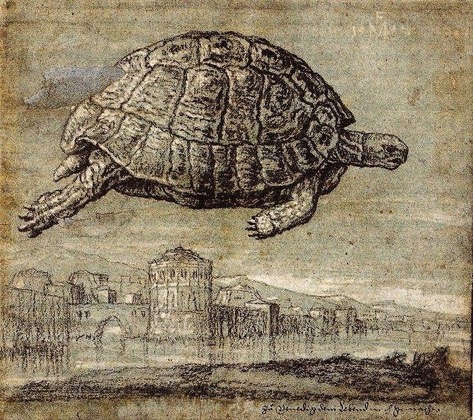
Tortoise above Venetian lagoon, Melchior Lorch, 1555
"Expect the skunkworks to fizzle after stinking up the joint."
Project Management's first principle, often ignored, insists that one must Hasten Slowly, for even The Ancients understood that each human activity held a natural cadence, worthy of respect, and that attempts to violate that rhythm reliably produced calamity. The human brain seems most skilled at imagining utter impossibilities. We experience an inconvenience and easily imagine better, faster, and cheaper ways to achieve that end, means which seem likely to produce less inconvenience. In practice, most of the time (not by any means all of the time) we produce greater calamity when attempting to speed up things. We shave subtle essentials like testing, for instance, which seems to produce no immediate value, even further slowing development when productive resource gets sidetracked fixing pesky bugs. We remain steadfastly capable of reducing any effort down to apparent essentials, eliminating what we, under duress, easily classify as trivial distractions, deferring any deeper appreciation of O-ring chemistry, for instance, until an even more inconvenient time. We take great pride at 'making our date.'
HasteningQuickly becomes ever more seductive when experiencing a critical necessity, like during a pandemic.
AskChewing
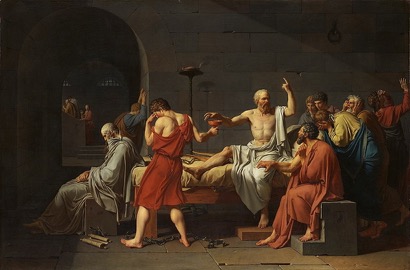
The Death of Socrates by Jacques-Louis David, 1787
"My foibles seem more prominently displayed than my mastery"
I once engaged in frenzied ten hour marathons of yard work whenever Spring finally came, as if I'd stockpiled overwinter energy and it was approaching its pull date. I'd rake and prune and mow and dig, leaving a cluttered pile of debris behind me, then drag that jumble out into an uneasy pile beside the driveway. I'd call Kevin with his trailer and pay him a hundred bucks to haul that mess to the dump or cut the shrubbery into small enough pieces that I could fill the yard debris container for weeks into the future. I'd end those days utterly exhausted and also utterly exhilarated, holding a feeling of mastery and dominion that winter had so recently successfully held at bay. These were genuine red letter days, memorable for the ten thousand ways I'd managed to overcome all the usual complications, my own initiating motivation not the least of these. I would have spent the better part of at least a week thinking through an effort that only engagement could ever resolve, telling myself that I was not so much procrastinating, but carefully planning. I was actually procrastinating, for such a momentous engagement awed me from before its outset. I both relished and feared the work.
Now, I tend to parcel out the springtime yard work into two hour pieces, distributing it over the opening weeks of the season.
Morpidity
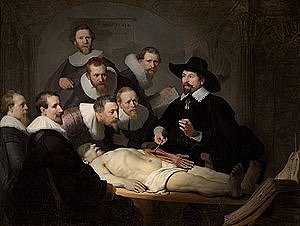
The Anatomy Lesson of Dr. Nicolaes Tulp: Rembrandt, 1632
"Our own innocence seems most vulnerable."
Up against The Ides of May, and best guess estimates of the number of pandemic casualties in the You Ess of A exceeds the number lost in all the wars we've engaged in since 1950. That's four and a half months to exceed the number of war dead over the prior seventy years, and we've been continuously engaged in war over that time. Some still doubt whether this epidemic hasn't been overblown for political dominion, with armed self-proclaimed militia "safeguarding" the "rights" of certain shopkeepers to encourage conditions shown to stimulate the virus' spread. Most of the dead seem innocent enough, having contracted the bug from inadvertent contact. I saw last night on television an interview with a top virologist who was recovering from a bout he figures he'd caught while on a flight to New Orleans last month. He wore a mask and gloves and carried his handy hand sanitizer, and had decades of experience working with killer viruses, but he still caught the damned thing. This bug respects nobody's God-granted or constitutionally-guaranteed rights to life or liberty, let alone the pursuit of simple happiness.
The Wisconsin Supreme Court overturned their governor's extension of his stay-at-home order, the justices insisting that he'd over-reached his legal powers in attempting to limit the possibility that some might otherwise needlessly die from viral infection.
Pauseperity
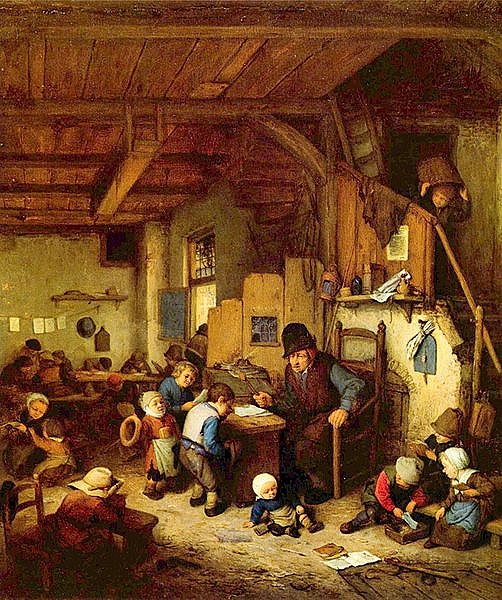
Adriaen van Ostade: The Schoolmaster, 1662
"What doesn't humble you makes you smug."
Our Pandemic has paused our planned prosperity. The Pestilence Horseman of the Dreaded Apocalypse rides roughshod through our society, heartlessly mowing down more than our fellows, for avoiding him drove us to flee from our jobs, our schools, and our precious, precocious society. One day, our economy seemed to be humming right along. The next day, it forgot that song: words, tune, the whole shebang. Even those who had subscribed to the widely popular Prosperity Gospel suspended their pursuit when manifestation moved from being a simple matter of personal motivation to one of humbled recognition and acceptance. Overnight, consumption turned cruelly inconspicuous when not even a stockpile of Benjamins could buy you toilet paper. We became jobless paper paupers instead of employed paper prosperous, suddenly unable to maintain appearances. Flow stalled.
The I Ching spoke of disruptive calamity overturning accustomed order, but those stories seemed more like history than current affairs.
GroaningUp
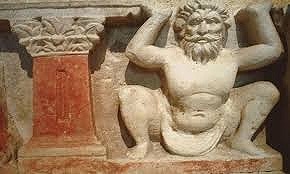
"We each hold our world on our shoulder and we are each still GroaningUp …"
The Greek God Atlas held the world on his shoulders, a curious career choice. I suppose world holding's necessary work, but necessary of the sort that someone else should do. It's a utility position, one with little self-promotional possibilities, offering no leave and little potential for advancement. It's maintenance work. Though Atlas is usually depicted wrapped in swaddling clothes, I imagine him dressed in J. C. Penney khaki work clothes and Red Wing work boots, like the janitor at my grade school wore, for he, too, inhabited the nether region of my world, down where the coal furnace belched heat and the teachers fled to smoke. The place everyone knew was there but nobody spoke about.
I later came to understand that Atlas' story served as an allegory for the all too human condition, for each of us holds a world upon our shoulders.
PandemicAmish

"I seem to have little to lose by dropping a century or two from my lifestyle."
As our pandemic disrupted lengthy supply chains, a certain simplicity seemed to emerge. The NYTimes Food Section features more recipes for dishes not traditionally found there, like beans and casseroles. Supermarket Ingredient sections seem hardest hit, with flour, pasta, and beans frequently unavailable for any price. Restrictions limiting a shopper to one or two of certain items have become commonplace. Our larder has consequently become more strategic and The Muse and I have increasingly become stockpilers, grabbing whatever's available when we spot it. The smaller shops seem better stocked. Thank heavens that our food security seems so far unthreatened, but our meals, always fairly simple affairs, have become even simpler, with fewer exotic fruits and vegetables and more reliable old familiars.
I've been reading a series of novels set around Ohio's Amish communities, and I sense a certain simplicity settling into our pandemic lifestyle.
History-onics

Le Désespéré (The Desperate Man), Gustave Courbet, circa 1843
"Suspended between two great mysteries, I face into another day."
I become a truly desperate man when asked about my past. I feel reasonably certain that I've had one—or several—but I don't recall specifics. I can't remember faces and must painstakingly reconstruct places and times. I didn't keep records other than journals and the few dated pieces of writing I've retained, many of them stored in formats now unreadable. Pass me a common "intake form" and I draw a blank, for I truly do not know. With considerable prompting, I might create a believable fiction, plugging dates and events to produce what might appear to be a credible history, but this will not resolve the fundamental mystery for me and will prove largely fictional in practice, should any of the details become critical for diagnosis or treatment. My past seems every bit as fictional and speculative as my future.
The pandemic has spawned a booming business in obituaries, half-page histories of those who've died.
ExtremeDomestification
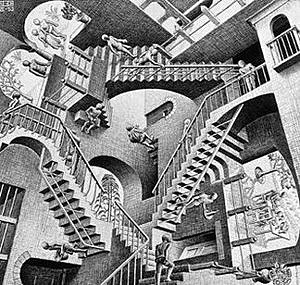
Relativity, lithographic print by M. C. Escher, 1953
"ExtremeDomestification seems to be positively effecting even the most feral among us …"
When under duress, I search for a reframe. My mother taught me at a very early age that toast never actually burns, but sometimes browns rather extremely. I grew to extend that response pattern into a lifestyle where my first (and often best) reaction to any adversity involved reframing the story. A bout of seasonal flu became a forced vacation. Car trouble wouldn't leave me stranded but engaging in an unplanned adventure where I might have to invent a new way to get back home. Doors didn't close behind but opened ahead. I found that I could safely reframe in response to what I otherwise might have classified as calamity, and thus retain some sense of control. I get to write my own story.
My reframing self might describe the Governor's Stay At Home Directive as ExtremeDomestification, for its effect has been to encourage transformation of what might have started as an authentic homebody into something more resembling a home soul, someone more than married to home life, but conscripted into it, sentenced to serve an indeterminate term with no reduction in sentence for good behavior.
Pretensal

Self-portrait, Jacques-Louis David (1794).
He was a dictator of the arts under the French Republic.
'Among the calamities of war may be jointly numbered the diminution of the love of truth, by the falsehoods which interest dictates and credulity encourages.' Samuel Johnson, from The Idler, 1758
"I intend to cast about for reassurances without pretense."
I compensate for my persistent lack of access to The Truth by embracing candor. I can certainly describe how things seem to be to me, understanding that this perspective might not have ever had the pleasure of actually meeting The Truth, but I at least own it. I can and often do leave myself feeling uncomfortable with my candor, understanding that popularity prefers me to project greater pretense, lest someone think the less of me. It's apparently a great sin for anyone to think the less of me. While I might certainly prefer everyone to appreciate my scribblings, I've been trying to get over the need to please, for that need alone can leave me a prisoner to pretense, poised atop a teetering tower of questionable premises.
Our current administration does daily battle with candor, a fresh poster child in a long line of similar poster children posing behind pretense.
NegativeSpace
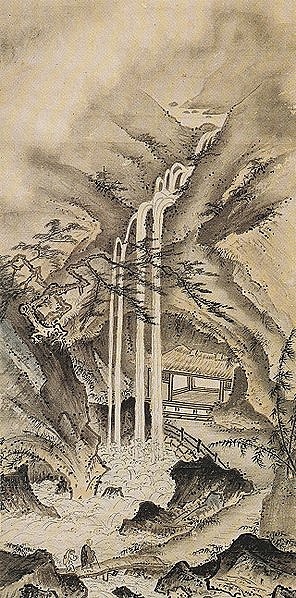
"Looking at a Waterfall", Geiami, 1480
"They seem to be discovering a world I desperately need …"
In the Japanese painter Geiami's Looking at a Waterfall, the focal point of the work, the waterfall, seems like negative space composed of the space leftover after he painted everything surrounding the waterfall. The painting plays positive off of negative to produce a seemingly complete image. Life, too, seems to present in this way. From my writing chair, the visible ridgeline seems projected against a negative background of sky, where nothing but 'not ridgeline' resides. The off-white wall between this room and the kitchen appears as a interruption, a negative space visually cutting off counter, chair, and floor when viewed from my writing chair. These words depend upon NegativeSpaces framing them. Even the now long-lived Stay At Home Order serves as a Negative Outcome Objective, its purpose being to avoid a result rather than to acquire one. Pandemics produce NegativeSpaces, haves and have-nots, where the have-nots seem to dominate.
I've been noticing how seductive the newly prominent NegativeSpaces seem.
Maudling
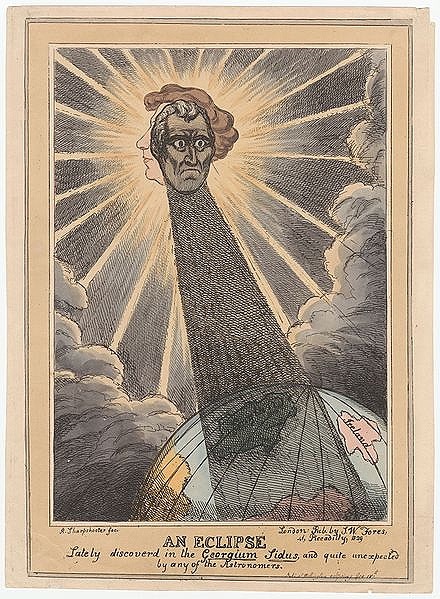
A satirical cartoon attacking the Duke of Wellington, then Prime Minister, for the passage in April 1829 of the Roman Catholic Relief Act
"We're still nattering over tactics, Maudling our way into an increasingly perilous future of our own creation."
My first project management assignment came over a lunch, from someone I didn't at the time report to who managed a department in another division of the company. A succession of actual project managers had failed to tame an effort, so my name had come up, probably over another lunch, where his VP and my VP had reached an agreement that perhaps informally assigning Schmaltz as a sort of stealth project manager might finally tether the aspiring initiative. I was told, as a first step, to, "go get the plan." Naive me, never before having managed a project, I set out on what would become just another chapter in a never-ending saga to find a reliable plan for the initiative. I'd initially thought my predecessors delinquent for having failed to at least produce a plan, though I later learned that a) no plan had ever existed because b) the effort was inherently unplannable. Those VPs who had so blithely recommended assigning me to fix the so-called project had abrogated their responsibility, for this project had no strategic intent, and no two people I spoke with while searching in vain for the plan, agreed upon the purpose of the project. I never did manage to produce a credible plan before the executives wisely chose to cancel funding for that woe begotten excursion after the fifth or sixth time that I'd reminded them that they'd need to decide upon some strategic intent before the effort could ever hope to satisfy them.
I mention this story at this time because it seems to inform our current dilemma in our ongoing battle against the insidious Covid-19 virus.
Doldrums
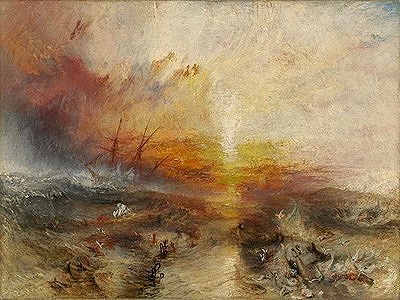
Slavers Throwing overboard the Dead and Dying—Typhoon coming on, J. M. W. Turner, 1840
"Adventure still awaits our arrival, entirely dependent upon our short-term survival."
We left port with reports of steady trade winds ahead, though those left us after two months at sea to find us beating across the Horse Latitudes of this pandemic. We lost the steady sensation of forward progress to enter a vast sea, seemingly endless, and so our originating purpose naturally diminished until we felt as though we held no aspirations save for the most primitive personal preservation. The crew grew increasingly restless as our collective helplessness came into ever sharper focus. With stores waning and patience at a premium, a certain feral nature overcame us. We lost our usual courtesies and decorums. We completed chores listlessly and suppers became sullen affairs with little evident cheer or hopefulness. We'd entered the Doldrums.
A second breadwinner in our extended family received his layoff notice this week.
Banqueting
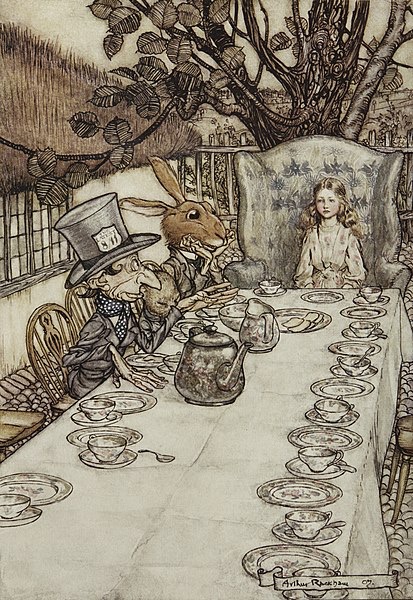
"A Mad Tea Party" by Arthur Rackham, from a 1907 edition of Alice's Adventures in Wonderland
" … like family turned recursive, …"
Every month or two, B. C., The Muse and I would host some sort of supper party. Often, when a group of visiting scholars or such would be in town for a conference, meeting, or workshop, The Muse would invite the whole gang, instructing me to prepare for fifteen to thirty, with no real way to verify how many might actually attend. I'd plead for information about food preferences and prejudices and eventually just end up making two or three or four suppers in one, so as to not too deeply offend the vegan, gluten-free, paleo, or pescatarian, for at least one of each was always certain to attend. I'd spend a day cleaning house and prepping food. We'd pull out the good china tablecloths and pretend that we always lived that way. The food never ended up being the centerpiece, though. The conversations filled out the proceedings as our guests made connections they could not have possibly made within the constraints of their regularly scheduled meetings.
These were inevitably enlivening evenings where, even though I'd end up staying up way past my usual bedtime, everyone seemed to leave feeling richer than when they arrived.
Eyedentity
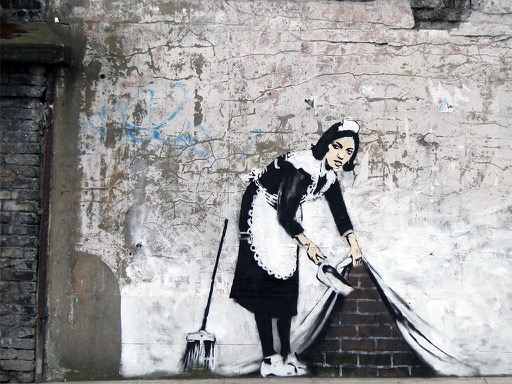
Banksy: French Maid, 2008 (Shoreditch, London street art)
"I could claim to be adapting, but I'm more emphatically faking it for now …"
I peer into my shaving mirror and see an aging Emeritus Professor of Ancient Languages in dire need of a haircut peering back out at me. I search, it seems, in vain for my usual cues while standing at something resembling parade rest, wondering where my initiative went. The season seems to be moving as seasons do, inexorably into, while I wait like a hesitant jump-roper to leap into each new day. I can't seem to find the old rhythm most days, and even when I catch a glimpse of it, the old timing seems somehow off and I'm caught tripping over my three left feet. In pre-pandemic days, my god-given two left feet seemed to serve me well enough. That third one, apparently sprouted since the disruption, often renders me flummoxed and confused. I usually find no clear clue what I should do next, … or before, either.
Some so-called primitive cultures forbade mirrors, claiming that they encourage unseemly vanity and worse, that they might steal souls.
ThUs
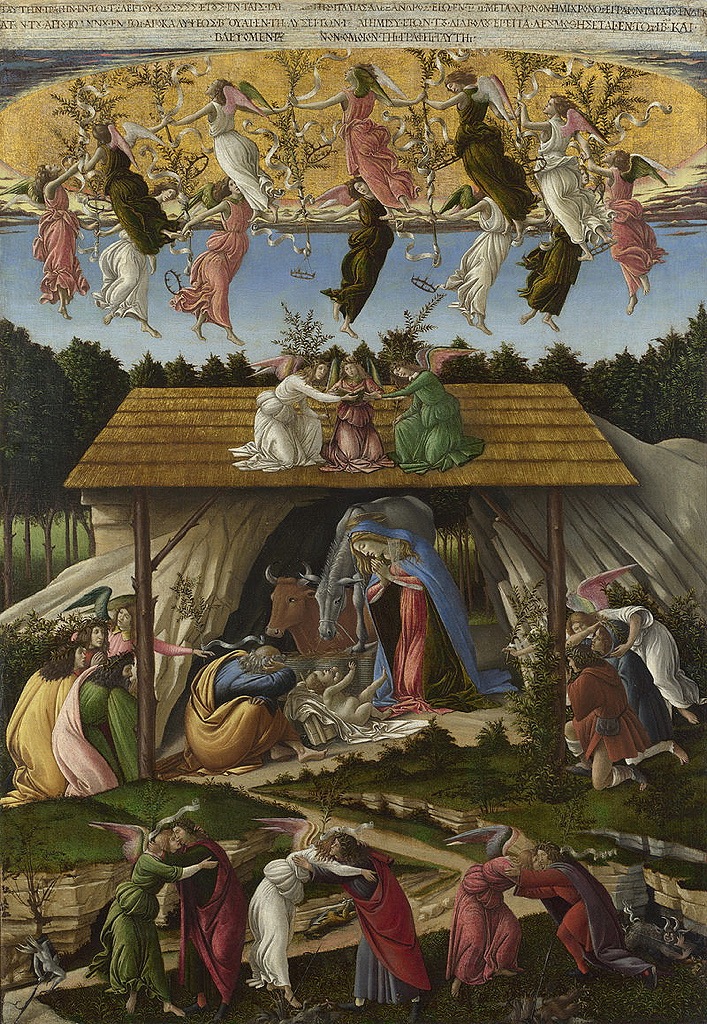
The Mystical Nativity, Sandro Botticelli, c. 1500–1501
Forget The Melting Pot, we're more rightly a stew.
In Botticelli's Renaissance masterwork The Mystical Nativity, symbolism seems thicker than the paint. He tried to depict the end of an apocalyptic time, when, after three and a half years rampaging around in the world, The Devil and his associates were relegated back into the underworld from which they came. Creepy looking angels dance above while others embrace "men of goodwill" along the bottom of the work. Both Mary and the Baby Jesus appear larger than life, a throwback perspective from times when photographic projection was often modified, with most important objects inflated larger than supporting ones. Overall, it appears as a busy image, but depicts a joyful time, for it shows a great evil exiting the world.
Some within each generation before and since sincerely believed that they were the chosen few, the ones intended to actually experience the apocalypse, apparently a longed-for honor among True Believers.
NewAbnormal
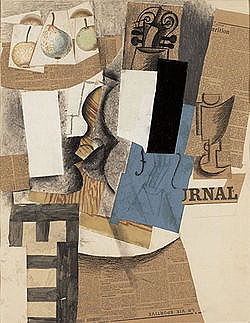
Composition with Fruit, Guitar and Glass, Pablo Picasso, 1912
"My job, our job, seems to be to out appreciate our Old Masters."
Abstraction did not take the art world by storm, but by slow accretion, for the art world reacted to this change not as an opportunity, but as a threat to tradition. Societies care about tradition because their identity lies there, reinforced by the familiar and seemingly threatened by difference. Past masters serve as exemplars, and gatekeepers insist upon fresh works properly respecting pre-existing works without actually plagiarizing them. Revolutions knock on doors for decades before anyone opens in response. Progress leaves snails feeling smuggy about their swiftness. Once the door opens a crack, it might seem to fly wide open in an instant, but those artists who idled in enforced obscurity for decades understand than the orthodoxy never really wanted anything to change and will continue trying to subsume them into conservative normalcy in lieu of actually accepting the changes they bring.
I hear much mumbling about new normals, generally idle speculations about what will likely irreversibly change once our pandemic recedes.
MaskedMen
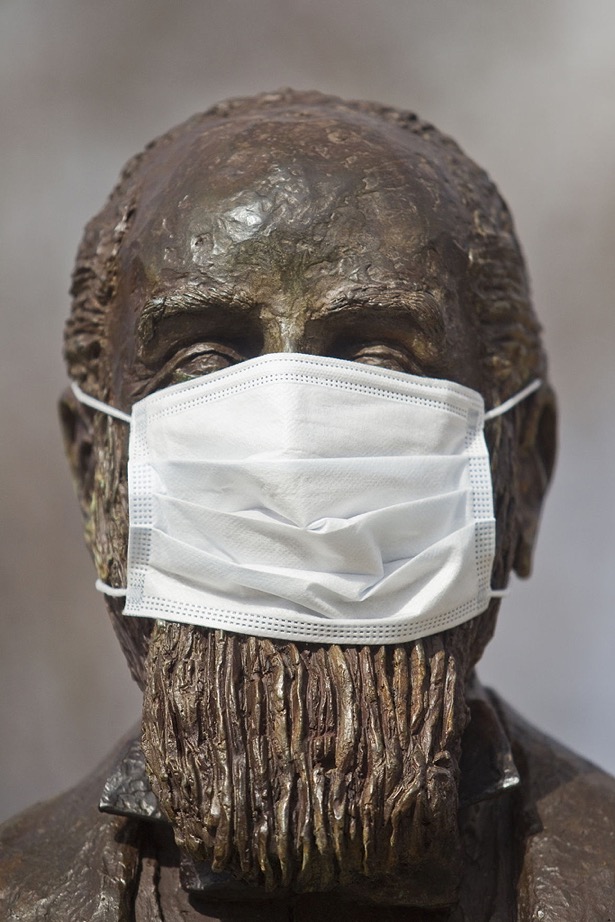
" [None of us should be] above extending an ounce of accommodation for a villain not wearing an identifying mask and not one of us can see."
B. C. (Before Covid-19), masks were for Mardi Gras, Halloween, burglars and Old West Train Robbers, and the occasional Lone Ranger. We intended them to obscure identity, though cowboys assigned to the hind end of trail drives might deign to slip a neckerchief up over their faces to fight trail dust. Okay, dentists wore them, and doctors when they were tucking into a case, but most of us never seriously thought about owning or wearing a mask. Now, that part of our world's turned inside out, and the responsible among us have grown to gladly don that mask when venturing out into public.
Those first few times, I felt self-conscious.
Evangelistic
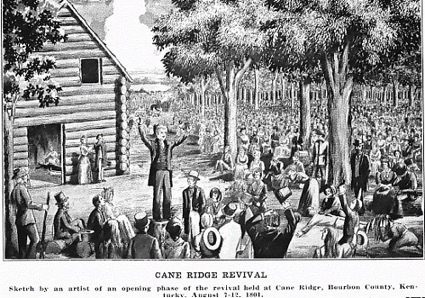
" … mostly learning how much more I evidently have to learn."
I never liked being told what to do. I found the experience humiliating when I was five and still find it annoying sixty-some years later. I live by a double standard, though, as I catch myself telling others what I think they should do with stunning regularity. My friend Wayne stopped me near the middle of one of my tellings to ask me if I'd ever considered asking him if he wanted me to clue him in before I commenced to cluing. His question shut me up and served to render me a tiny bit more sensitive about how my tellings might affect my many targets.
While I can get carried away, I reason that I might find myself in reinforcing company, as society seems to have slipped into an Evangelistic phase.
Logistics

Pre-war Scammell Pioneer
" … necessity being the unforgiving step-mother mother of reinvention."
If my decades working in project management taught me anything, it taught me that an ounce of properly focused logistics tends to be worth a ton of almost anything else. Though nobody ever received a Congressional Medal of Honor for clever logistical support, none of the "great" battlefield victories throughout history could have been possible without a bunch of back office shenanigans worthy of deep respect. Our struggles over responding to Covid-19 clearly demonstrate the necessity for competent administration. Sending more first responders to the front might encourage upswells of sincere appreciation from a grateful population, but we witness otherwise unnecessary sacrifice as these genuine heroes fabricate their own personal protective gear and work around all the services suddenly rendered unavailable, like testing, apparently due to some genuine Bozos handling logistics. The World Health Organization has distributed hundreds of thousands of test kits everywhere but to the used-to-be good old U. S. of A. because some back office politicking decided that we should go our own way. All by ourselves. Alone.
Battles tend to be lost for want of a horseshoe nail as shortages cascade to render moot even the grandest intentions.
NotQuiteYetSpring

Henri Matisse: Olive Trees at Collioure, 1906
Not Quite Yet Spring
Following Winter Solstice,
Springs goes on the move,
heading northward at the stately rate
of almost eighteen miles per day,
an enthusiastic snail’s pace
but still well within a snail’s range.
A walking horse might make
slightly better time.
Those in Florida,
who overwinter in Spring,
hardly notice anything like change,
Alchemy
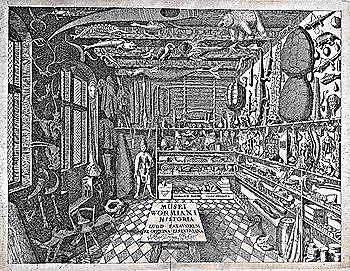
Ole Worm's cabinet of curiosities, from Museum Wormianum, 1655
" … a cure for the curious urge to go seeking cures."
Being human apparently roughly equates to being passingly or chronically ill, with about half of humanity dedicated to somehow healing the other half during normal times. Pandemic times lower an already fairly low bar, with virtually all of humanity suddenly in increasingly desperate need for a cure which nobody possesses yet. This condition flushes out the alchemists and their claims. A self-proclaimed church in Florida insists that they've discovered The Cure, the mother load of all cures, the one that they claim can cure pretty nearly anything, though the FDA counters that it seems an effective cure for life, in that it just might kill you. An industry thrives along society's bottomland, hawking poison and placebo with equal zeal. The deal always seems to be the same: send money and we'll disappear into the ether. Word of desperate mouths spreads the story. Innocents and charlatans seem equally vulnerable. The Cure, sometimes producing worse than whatever the disease threatened to leave.
Up until two years ago, I'd lived prescription-free for two decades.
Retreating
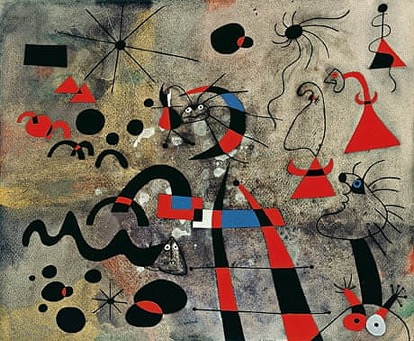
The Escape Ladder by Joan Miró, 1940
"Our sanity now seems to lie in mere reason …"
When the thoroughly modern organization wants to move forward, to spawn a fresh initiative, they call a retreat. Over the last few years, Major League Baseball has seen an unprecedented spike in home run hits after a counter-intuitive practice gained broader acceptance: hitters learned to cock their bats backwards and up instead of immediately thrusting them outward and down in that split second after the pitcher released the ball. On weekends, city dwellers fled their cities while hinterland dwellers flooded into them, intent upon a respite couple of days just getting away. Farmers left for their escape cabins in the woods. New Yorkers hopped cheap flights to Paris. Walla Wallaians headed over to Portland while Portlanders zooted over to Walla Walla. Over my lifetime, we have sought retreat as renewal.
Now, living under lock without key, we cannot so blithely retreat.
Aloneliness

Thérèse by Balthus (Balthasar Klossowski), 1938
"I deeply appreciate those of you who have proven yourselves to be dedicated repeat offenders …"
I felt Alonely this week, this isolation's permanence coming into ever sharper focus. Aloneliness feels quite different from plain old loneliness, less disquieting but also more seemingly absolute. I just pretend that I understand these boundaries now. Protests against the Stay At Home Order reinforce my resolve to respect these rules. I think those shunning face masks fools, people who revel in demonstrating that they haven't a clue what they're doing, and deep-down disrespectful. Do we not have a duty—civil, moral, or simply out of courtesy—to continue to color within these inhibiting lines? The neighbor kids don't care and their parents seem just as powerless as I to influence their clumping together. They roam my yard like they roam their own, and every other, littering rocks and overturning flower pots in exuberant play. I deeply envy their easy association, for I remember when those days were mine, surrounded by a noisy throng of siblings, neighbor kids, and sundry hangers on.
I grew up in a family with five kids. I remember spending a significant portion of my formative years fleeing from that throng, seeking some place where somebody wasn't up in my face all the time. I sought space to hear myself think
NeutronNews
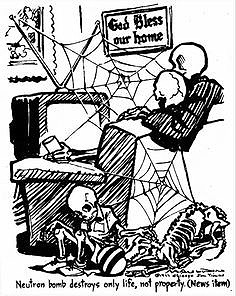
"What else might decency do?"
Effectively responding to a Pandemic requires access to good information about its nature, which begins as almost entirely unknown. Speculation replaces authentic fact at first, and probably necessarily so. Later, as initial inquiries yield additional information, our understanding deepens and broadens, and our responses' effectiveness improves. Not all sources of information seem equally dedicated to publishing 'the truth and nothing but the truth,' but the truth might well be initially impossible to come by at any price. Later, as apparent facts accumulate, rough truths might appear. I say "might appear" because not all sources seem equally dedicated to reporting facts. Our well-imbedded Fake News system, for instance, rarely finds a fact worth proliferating, for every event, for them, seems more an opportunity to amplify some pre-existing perspective than to discover or learn anything new or informative. Fake News rattles the same old sword regardless of anything actually happening in the world, and I suppose this underlying (lying) consistency satisfies a certain portion of the population. Even pure bullshit carries a dedicated constituency.
Fake News outlets revel in accusing their more reliable counterparts of proliferating Fake News, echoing an ageless "I know you are, but what am I?" feature of the human condition.
Scenario-ing
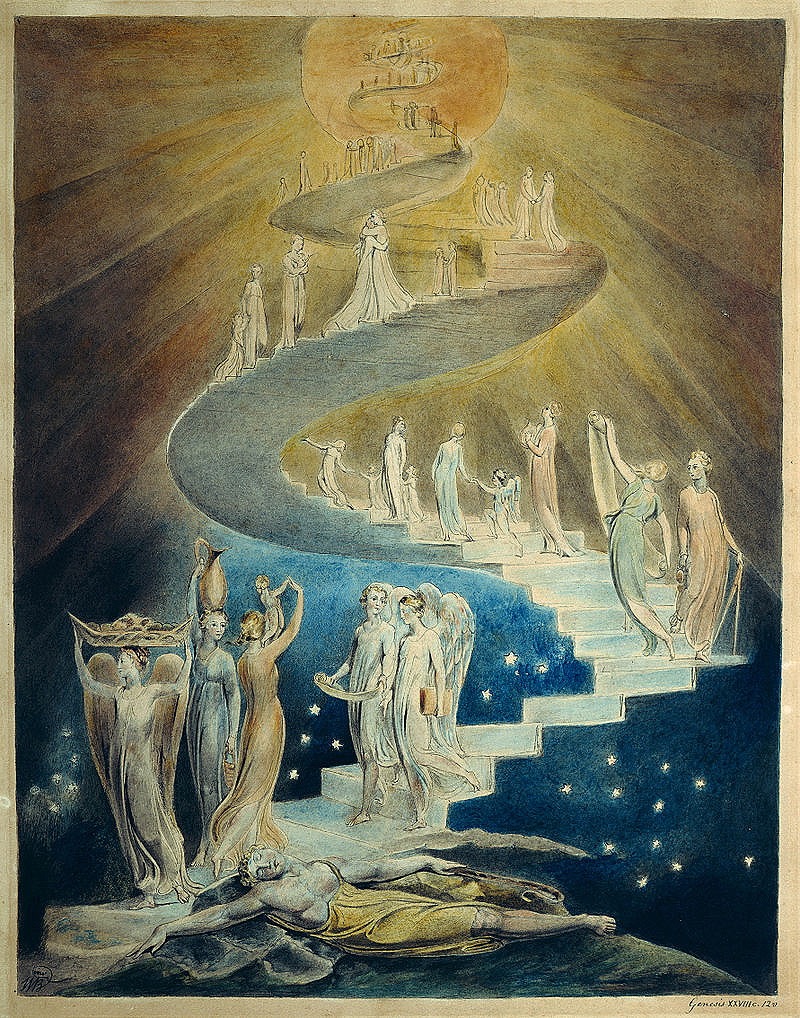
Jacob's Ladder by William Blake, 1805
And Jacob awaked out of his sleep, and he said: "Surely the LORD is in this place; and I knew it not." And he was afraid, and said: "How full of awe is this place! This is none other than the house of God, and this is the gate of heaven." — Genesis 28:10–17 Jewish Publication Society (1917)
"Which scenario wins what?"
The pragmatist insists that we're just where we are. The philosopher wonders how we know. The scientist sets out to understand well enough to definitively say, with studied degrees of certainty. The cynic, quite honestly, doesn't care. The optimist remains ever hopeful. The skeptic insists upon the benefits of doubt. The pessimist prefers to pout. The writer shares the stories which the artist illustrates. The minstrel crafts the tune. The politician shares a Spandex® truth. Each holding their own perspective; each perspective, a part of some whole. Each provides a slant none of the others could know. None holds The Truth that everyone does.
The Muse found a social media posting which insisted that The Rockefeller Foundation with the support of Bill Gates had planned our present Pandemic, then implemented that plan with the clear intent of achieving world dominion.
DreamState
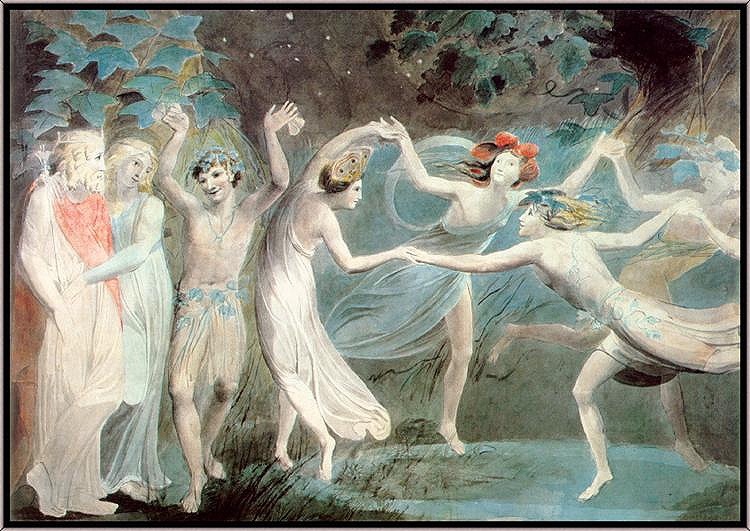
Oberon, Titania and Puck with Fairies Dancing, William Blake, c.1786
"I seem to have stepped into another life which fills in the holes in the one I used to know so well."
Never much for sleep, I find that I've been vividly dreaming during this Pandemic. I had grown infamous for never needing much more than four or five hours of sleep and never remembering my dreams, but this last week or two, I've been sleeping through my three am alarm and sometimes even struggling to rise. I find myself so imbedded within alternate universes that the sunrise sometimes beats me up, an almost unprecedented occurrence. I revel in these scenarios flickering behind my eyelids, feeling warmly welcomed and more at home there than within my actual home, which has grown lonely and boring through the shutdown. I experience no empty hours in my dreams, but thrive. Last night, I bought into owning a restaurant on New York City's Upper West Side, a soon to be jazz club featuring fine but not fussy dining and first-class combos. The dream left me feeling exhilarated in ways the Stay at Home Order never has.
Humans seem capable of nearly infinite compensation.
Stew-pid

Rembrandt: The Parable of the Rich Fool, 1627
One of the multitude said to him, "Teacher, tell my brother to divide the inheritance with me." But he said to him, "Man, who made me a judge or an arbitrator over you?" He said to them, "Beware! Keep yourselves from covetousness, for a man's life doesn't consist of the abundance of the things which he possesses." — Luke 12:13–15, World English Bible
"Some days I wonder where we think we're trying to take ourselves."
I have never been judged as one of the brighter bulbs on the Christmas Tree. This makes me a more or less prototypical American, for we were originally rejected stock: refugees and convicts, renegades and conniving scoundrels. Even the Pilgrims were more budding capitalists than pious pioneers, for they arrived with backers promising wealth in exchange for their sacrifices, servicing enabling debt more motive for their perseverance in this world, if not necessarily the next. Our founding myths largely ignore these truths, insisting instead upon a certain unconfirmable self-evidence that we were somehow, unlike every other culture in the history of this world, created more or less equal. Above all, we seem to revel in characterizing our fellows as Stew-pid, so stupid that they cannot even properly spell the word describing themselves.
We have a long history of calling reason oppression and strongly resisting that trumped up oppression on Constitutional grounds.
SiegeMeals
"I understand that my current siege mentality serves as evidence of an underlying emotional immaturity …"
Suppertime arrives even when living under a Stay-at-Home Order. We won't order out, though I've considered it twice and even resorted to take-out pizza when the ennui inertia overwhelmed me. Most days, I find that I can still face up to my responsibility to feed the household, though the larder's slipped somewhat sideways between the simple inconvenience now associated with restocking it and the curious unavailabilities attempting to restock it reveal. I wonder what it means when the veg store offers not a single potato for sale, but it seems to bode well for nobody. I find curious combinations of plenty, which cast strange shadows across the kitchen come suppertime. Accustomed combinations disappear, replaced with strange plate-fellows. Each suppertime has become a fresh WhatNow? engagement.
Before this siege began, I spent a couple of weeks crafting an array of stocks: turkey, veal, goose, chicken, and veg, so we, by fortunate accident, hold a surplus of this one irreplaceable component.
Fiberation
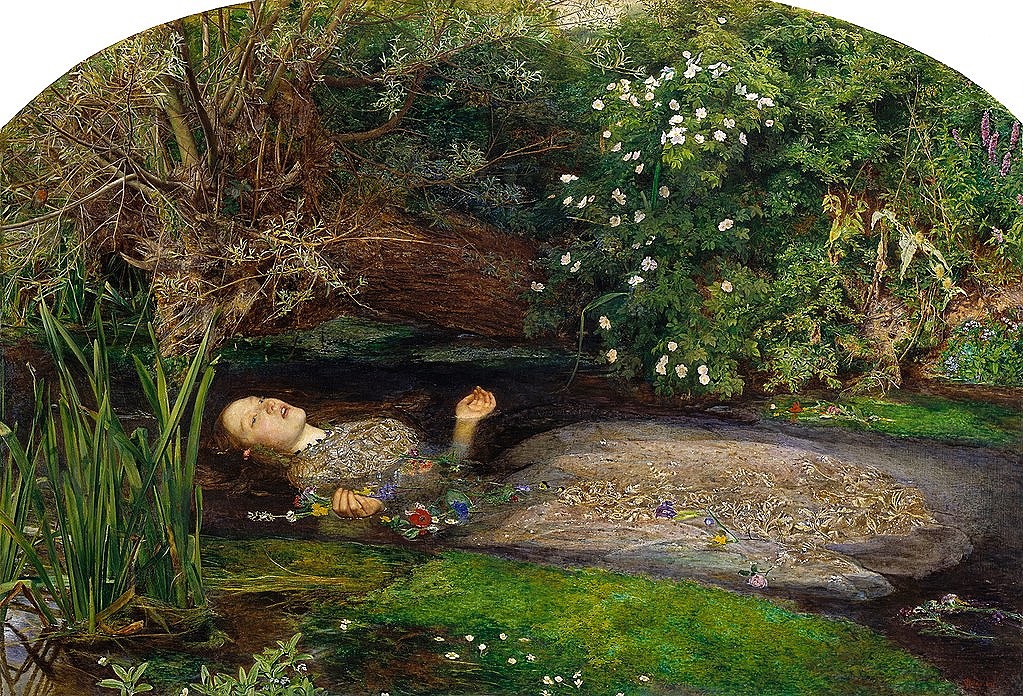
John Everett Millais: Ophelia, circa 1851
"What else could any obedient citizen do?"
We're enjoined to avoid all but essential outings, so the term essential takes on surprising ambiguity. I cannot honestly say that maintaining my former consumption levels in any way qualifies as an essential objective. In my young adulthood, I sometimes foraged for my supper. Since, I've grown accustomed to a certain relative opulence, but just how essential could any of that be? I remember the time before there was ever wine with dinner, and those long years during the cholesterol scare of the eighties and nineties when I lived on boneless and skinless chicken breast. I became more omnivorous since, but I can't really claim the resulting variety essential. Does boredom constitute an intolerable condition? Do I really need that bag of potato chips or are they just a nice-to-have?
The Muse and I escaped for a scant two hours yesterday afternoon to restock what passes for our wine cellar.
PanDamning
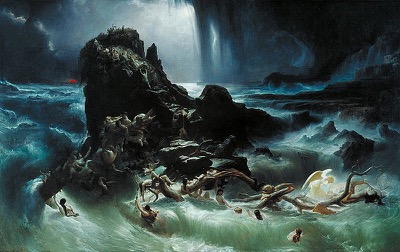
Francis Danby: The Deluge, circa 1840
"The worst hard times, the best hard times, or simply our hard times?"
The rising sun tints the eastern horizon pink and robin egg blue, transforming the conifers along the ridge into silhouettes of themselves. Yesterday's spring snowfall lies heavy upon the backyard pine's limbs, gloopy frosting expertly draped. By the end of this day, the twisting road up from the interstate will have burned to bare and dry. Tomorrow, the buried sprouting springtime will have reemerged back into warm sunshine again. I might have yesterday shoveled the last snow for this season, and I'd find reason to celebrate this small liberation if I had not grown to revel in the work. We weren't going anywhere and I insisted upon shoving snow anyway, a regulating obligation in my day, admittedly made up so that I had something different than numbing sameness to do. It seems so damned peaceful here.
I understand that these are the worst of times, the leading edge of what might prove to become another Great Depression, but the general impression I've received witnessing this latest apocalypse has not seemed at all like what I imagined end times would be.
OutOfYourASSumptions

El Greco: The Burial of the Count of Orgaz, between 1586 and 1588
"'Twas always thus."
I think of the initial stage of every initiative as The Assumption, and Our President's strongly rumored and much reported task force's grand plan to reopen the country amid the current pandemic proves no exception. It seems to be emerging as an absolute exemplar of this general rule. The first iteration always seems to have been pulled directly out of somebody's BIG ASSumption. To many, it already seems unworthy of ever seeing the clarifying light of any day, more a self-portrait of narcissistic delusion than serious proposal, an embarrassment to its authors' intentions. It presumes altogether too much and also discloses waaaay too much. Couldn't there be a better way?
For the first iteration, I've grown to understand that there could have been no better way, for something needs nudging off its dime if any result is ever to come to pass.
PandemicShopping
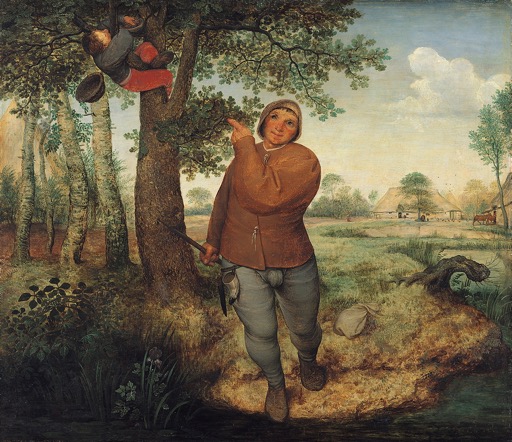
The Peasant and the Nest Robber, Pieter Bruegel the Elder, 1568
"I'll know for sure that it's safe to reopen the economy when toilet paper once again becomes a pedestrian purchase."
I feel increasingly like an old dog struggling to learn new tricks. Never that adaptable, I change when forced to and struggle to shift my studied routines. I've long considered myself an expert shopper. I hang around a supermarket's periphery, avoiding the central aisles. I hover longer in the produce section than in any other. I'm not embarrassed to exit without purchasing anything if the stuff I came to buy isn't available. Unavailability has over the past month become the new defining characteristic of shopping here. Whole aisles of empty shelves greet the aspiring shopper. Combined with the face masks and the continual Corona Veers, where erstwhile shoppers inevitably fail to maintain six feet of distance from their suspicious-looking fellows, perusing a minefield might prove more satisfying.
I'm growing to realize that selecting and purchasing amounts to something less than half of grocery shopping's allure.
R-E-S-P-E-C-T

Procession of the Youngest King (Lorenzo de' Medici), Benozzo Gozzoli, between 1459 and 1460
"An ounce of respect counterbalances a ton of manure."
My father told stories about his older brother Dan, who was headstrong like his dad. The two boys lived with their Old World grandfather, who subjected them to severe punishment should they misbehave. Dan couldn't seem to help himself and almost daily ended up receiving a whipping and a lengthy time-out in a dark cellar room. Their father had been disowned and disinherited after acting out as an adult, though he might have known better since all but one of his siblings had been likewise disowned and disinherited before him for similar infractions. My great grandfather was doubtless a tyrant, but tyrants above all else respond poorly to perceived disrespect. My dad would plead with Dan, reminding him that things just went easier if he would at least pretend to comply instead of continuously defying. My dad grew to become a humble and deeply respectful guy, and I suppose I sort of naturally lie rather more low than I otherwise might. Dan never learned.
I will admit to a few memorable attempts to stick my thumb into an eye of authority.
HighHollowDays
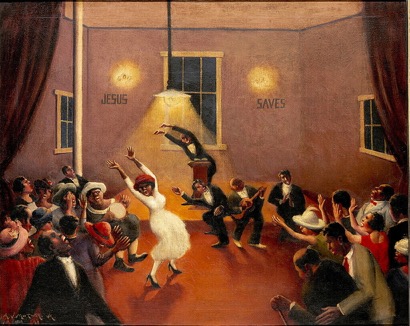
Archibald J. Motley Jr., Tongues (HolyRollers), 1929
" … segueing back into the infinitely more joyful ordinary times. Amen."
The high holy days of the Christian calendar induce a sort of seasonal affective disorder in me. I understand that these, above all other days of the year, focus upon producing cheer over depressive rumination, but the expectation that I should find joy there works like a paradox to induce the opposite. Not precisely sadness, but more of a hollowness overtakes me. These seem like hollow days of obligation, because in obligating, they undermine celebration. Requiring joy obviates every possibility for experiencing it. I'll go through the motions, but with a sinking heart.
I might lose the vibe in preparation, for my heart does tend to soar in warm anticipation that the blessed day might just this once appear as advertised, but it comes as it always came, rushing off to some semi-annual church service or sequestered at home with nothing but boring family surrounding me.
Affronting
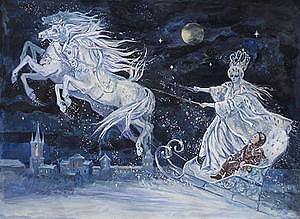
The 2020 Easter Bunny
"The Snow Queen" illustration by Elena Ringo
from New Fairy Tales. First Volume. Second Collection. 1845
by Hans Christian Andersen
"Watch and maybe learn something new about yourself."
Easter morning brings an arctic cold front along Colorado's Affront Range. Snow starts falling well before the regularly scheduled and much-vaunted Red Rocks Easter Sunrise Service, which had been cancelled, anyway, as a part of The Governor's Coronavirus Pandemic Stay-At-Home Order. The sunrise itself seems to have been cancelled, replaced with a slowly increasing grayness seeping through sifting snowfall. The Muse rises long before any resurrection to start a batch of yeasty-sweet Hot Cross Buns. We display colored eggs in a transparent plastic tray on the kitchen table, no bunny willing to brave the swirling winds to hide them outside, where they'd just freeze and discolor the snow, anyway. Molly The Mardi Gras Mask-faced kitten and Max The Smutty-nosed Kitten sniff at the vase filled with small red tulips displayed atop the dining room table. This weather seems an affront to Easter, indeed, an affront to Spring, so we seem to be celebrating Affronting this Easter day. How to properly celebrate?
Some important something probably lurks here within this upside down, backwards and sideways holiday.
MistOpportunities

David I of Scotland knighting a squire, 14th century
" … I exclusively pave the way I came, not the way I'm heading."
How did any of us end up here? What lucky breaks and unfortunate accidents summed to here and now? I suspect that this question might most probably deflect any How response. Though the story might make diverting legend, beyond entertainment, it probably couldn't qualify as instruction, any sort of functional How To. I think it most likely that nobody knew how until well after accomplishing any achievement, if even then, though many of us obsess over how before engaging, as if our next experience couldn't possibly fill in gaps in our prior experience. Many of us carry discovery fantasies that we might stumble into some well-placed connector who will discover what we have to offer the world, and benevolently or greedily pave our way. In my experience, which, like yours, never rises above anecdotal example, ways forward do not tend to be paved. Few have been discovered while sitting at a lunch counter at Hollywood and Vine. Heck, few of any of us ever manage to get discovered by anyone but ourselves.
I firmly believe that human progress has always been driven by synchronicity.
ToGo
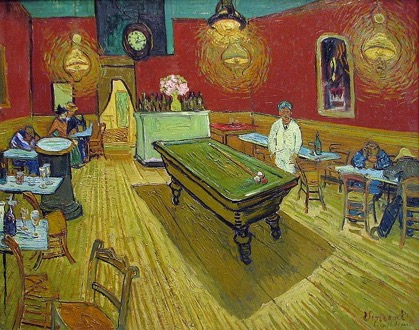
The Night Café by Vincent van Gogh, Arles, September 1888
Reputed to be the ugliest van Gogh painting
"I'm feeling closer to some essentials now that I'm taking everything ToGo."
I'd really rather eat in a diner than any other kind of restaurant. I never feel completely at home in any of them, but neither do I feel terribly alienated there, either. I find no wine list to wonder over or small plates to challenge my patience and my pocketbook. The menu features only simple food and the atmosphere feels more like grandma's dining room than grande salon. Someone always greets my arrival as if they had been hoping I'd drop in. The decaf's inevitably crap but the food's honest, cheap, and good, if not necessarily that good for me. I order off menu, almost always the same thing, breakfast of sorts regardless of the time of day: hold the eggs, smother the hash browns, and throw a sausage on the side; maybe a biscuit to finish. I open my trusty Times with a half dozen conversations burbling around me and a running joke passing between The Regulars and the waitresses. I'd claim that I I eat in anonymity except my waitress keeps calling me, "Hon." The vibe of the place renews me more than does the meal.
I can't get that experience ToGo.
Distancing
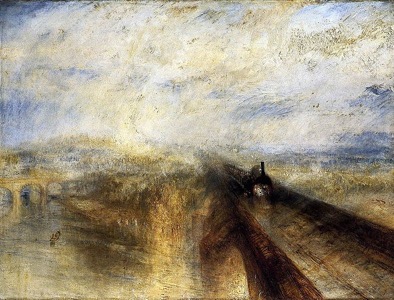
J. M. W. Turner: Rain, Steam and Speed – The Great Western Railway, before 1844
"Distancing seems to open up spaces rarely glimpsed since the transcontinental railroad appeared."
One of my great grandmothers crossed on the Oregon Trail on horseback. The trip took months. Twenty years later, she made the same crossing in a few days by train. If anything most typifies this modern society, ever increasing mobility must be that thing. I remember our neighbors flying to attend a convention when I was small, when jet travel was still a rare and novel occurrence, at least in my neighborhood. Their mom, a slim and elegant woman, wore gloves for the trip and brought back these little packages of three cigarettes they'd handed out for free on the flight. I could see the future from there! Up until last month, planes crammed full of people wearing their pajamas as if they were lounging around on a couch at home, were departing every other minute with fares well under the price of a modest dinner out somewhere. People flew on less than a whim.
We've temporarily traded in our mobility, Distancing in solidarity and/or fear.
Marked

Saint Francis of Assisi Receiving the Stigmata, attributed to Jan van Eyck, c. 1430-32
"My turn will eventually come …"
At five, I was slated for a tonsillectomy. My older brother and sister were to undergo the same procedure at the same time, but when we arrived at the hospital, I was somehow deemed too anemic or something and sent home all by myself in a cab. I still remember that deep sense of relief I felt as the cab pulled away from the hospital with me thinking that I'd actually gotten away with something Scot-free. The next day, my brother and sister were granted unlimited ice cream rations in which I could not share. In a week or so, I had to go the hospital alone to get my tonsils pulled. I remember nothing about the entire adventure except for that great relief I felt when I dodged that bullet, and even though that bullet came around and got me on its second pass, getting away with something made the whole experience well worth the trip.
I suppose that everyone appreciates feeling special, perhaps because deep down inside most of us don't feel all that special.
PrecisionAbstraction
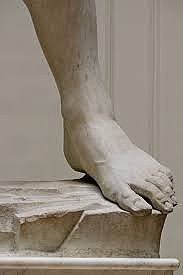
A Foot of David by Michelangelo (Detail), 1501-1504
"Imagine how smuggy I felt …"
PrecisionAbstraction has proven to be a prominent bane of my existence. I can thrive on abstraction until precision steps in. Then, I feel myself smothering. Still, I try to maintain a positive attitude. Last Spring, when I ordered mulch for The Villa's odd-shaped front garden bed, Tom The Nurseryman deflected my request by insisting that I produce a PrecisionAbstraction, the landscaping equivalent of throwing down a gauntlet. I would have to produce, as a qualifying action, a statement of how many square feet of mulch I'd need. I retired to my lair to consider this challenge.
I walked the perimeter of the bed, a space without a single regular angle.
Pacing
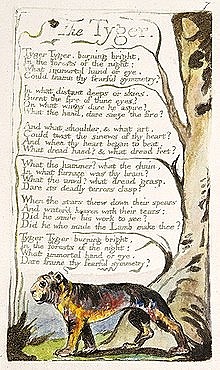
The Tyger, William Blake (1794)
"What fearful symmetry, indeed."
After Max The Smutty-nosed Kitten broke curfew and disappeared overnight, I put the pets on lockdown. I might have chosen to do this out of a curious form of spite, for I've been on lockdown for almost three weeks now. I kind of cower within my perimeter, pacing with my head held down as if embarrassed by my limitations. Like our kittens, I know myself to be capable of ferocity when in pursuit, and my still new boundaries more than merely limit my range. They limit my imagination, too. I feel like a clipped-wing bird unable to soar. My mind races endlessly, to no particular end, my perimeter seeming to define more than my range, but also my possibilities.
I always thought that I understood why the tigers paced in their cage at the zoo, but I'm gaining a fresh appreciation for just what cages do, whether they be physical, limiting range, or emotional, inhibiting whim.
Lent
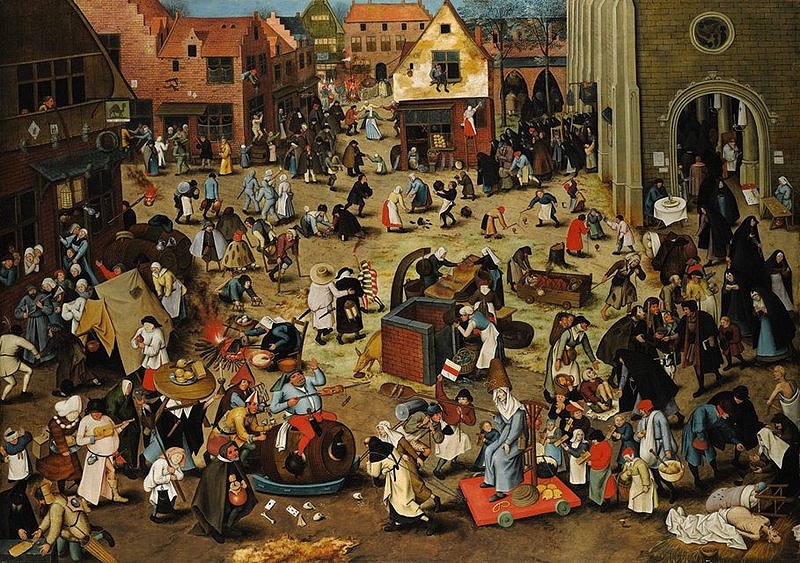
Pieter Breughel the Younger (1564–1638), Battle of Carnival and Lent
"Beginning on Ash Wednesday, Lent is a season of reflection and preparation before the celebrations of Easter. By observing the 40 days of Lent, Christians replicate Jesus Christ's sacrifice and withdrawal into the desert for 40 days. Lent is marked by fasting, both from food and festivities." - Wikipedia
"Does anyone ever give up procrastination for Lent?"
Not having been raised in one of the classical Christian churches, my birth family never celebrated Lent, though I gather from The Muse's recollections that Lent in her Catholic family tended to be a Freaky Friday kind of celebration, by which I mean pretty much the opposite of celebration. She remembers giving up candy for Lent, a childhood practice that she swears made Easter candy that much more enjoyable. My family had more of a barely scraping by attitude to life, and I guess we figured that every day was already more or less Lent for us. Skin and bones possess little to further sacrifice. I notice when Ash Wednesday arrives, though. I revere the tradition without actually participating in it, the same way I revere Mardi Gras, as somebody else's fracas. I usually consider giving up something for Lent, without actually carrying through. I'm plenty penitent, but never overtly.
This year, though, the Year Of Our Lord 2020, everyone gave up something for Lent, unless you happened to live in one of the nine or ten states that chose to continue regular programming through the blooming pandemic.
-Triarchs

De koning van Thule, Pierre Jean Van der Ouderaa (1841-1915),1896
"This damned plague's taking our -Triarchs and leaving only us factory seconds behind."
This pandemic has been taking the -Triarchs, the matriarchs and the patriarchs, my elders and wise ones. I feel as though the fine frescoed ceiling that has always sheltered me is blowing away, leaving me without a roof over my head. I feel myself filling with a dread certainty. As the -Triarchs leave, I watch myself shuffle nearer the top of the heap to emerge as an elder. I try to rebut this commission, for I feel far too young and inexperienced to ever take the place of anyone I so long looked up to in wonder. For they genuinely seemed to levitate above the day-to-day to live nearer infinity, timeless in their age and experience. True, they had each once seemed more like me and you, bold youth, braless or with overlong sideburns, protesting how it had always been before. They opened the doors I later strolled through. They went through first, even to their last.
The past is forever past once the -Triarchs pass, a different scale rules forever after.
UnCountables(2)

Print Study/Drawing from The British Museum Collection
"I wanted to be certain to get my spurious statistics straight."
I rarely publish two PureSchmaltz Blog posts in a single day. This morning, though, I spaced out my usual intention to review the receding week's posts before moving on. I couldn't imagine any elegant way to simply append the following into what I'd already published, a screed on UnCountabiles. I'll call this review UnCountables(2) to strongly suggest just how meaningless social media use statistics seem. Not that I denigrate a single one of the six hundred-some unique page view that you, my generous readers, left to me this past week. I praise every one as the miracle it certainly seems. Still, I can't quite distill any great wisdom from the numbers alone. I suspect that these counts hardly hint at the value these postings hold, especially to me. I'm grateful for every even disinterested peek their presence attracts.
On the eventual grand list of weeks, the week leaving this morning will very likely stand near the top of the upper quadrant of Helluva Weeks
UnCountables
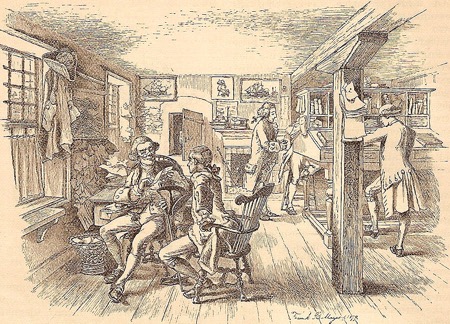
"An Old-Time Counting Room," Fell's Point, Baltimore, MD, c. 1770; drawing dated 1879.
"We shared so much together back when we still lived so fiercely independent of each other."
We might pride ourselves on our fierce independence, though none of us do very much alone. Birth, marriage, graduation, financial success and failure, not even death can be accomplished alone. Each experience occurs through intimate association. That home, so proudly all-by-yourself owned, was purchased from someone, probably painted by others, and serviced by a small legion of supporting personnel. Each birth required a father and a mother, a midwife and aide. Each marriage, even one officiated by a lowly Las Vegas Elvis impersonator, brought two people together. Death demands some other to cart off and dispose of the corpse. We accomplish nothing alone.
The daily numbers numb me.
Emergence-y

Woman Holding a Balance, Johannes Vermeer, c. 1664
"The kids still want to see the cats, up close and now …"
The neighbor kids flocked toward the front door, demanding to see our kittens. The cats, on their first foray outside, strictly supervised and extremely wary, quickly disappeared back inside. I explained the dilemma to the kids: wanting to see them up close pretty much guarantees that they might see them from afar, fleeing. Searching for them ensures that they'll never be found. If they want to see them, they'd have to be satisfied with watching them from the distance of the street, but not even that alternative guarantees that they'll see 'em. The kids, baffled by my babbling, quickly dispersed, leaving me wondering what I'd just described. It occurred to me that the cats had become a decent allegory for Emergence-y, and seeing them at all, a good example of an emergent property. Sometimes, certainly not every time, when conditions seem right to them, the cats emerge, never together, almost always one after another. Sometimes Molly emerges first and sometimes, Max. I can't ask them about the criteria they employ to determine if it's safe enough to emerge. The conditions seem to vary. I'm left with inventing various speculations about what constitute necessary and sufficient conditions, most of which seem to serve to satisfy my curiosity without actually explaining anything.
When I leave the front door ajar, they sometimes emerge.
EventHorizoning

"Activity poisoning," I declared. "A classic case!" Slip over here for more ...
Pace

Chicago Rush Hour - 1909
"Nostalgia's not half what it's cracked up to be."
Within every pandemic, some optimist appears to cheer on the positive side of the thing. We do seem a whole lot better connected in isolation than we ever did when roaming around unconstrained. The vehicle traffic has abated to levels the streets seem to have been designed to hold. The road past The Villa sees much more foot traffic, with a steady parade of dog walkers, joggers, and couples strolling while holding hands. Kids pedal past in a nearly endless stream, and I'm sitting out front reading in the afternoon sunshine. The Pace of life has slowed to a rate I've rarely known. Home feels homier, too.
I keep losing my place in the novel I'm holding as I glance up to greet yet another neighbor walking by.
BlindWatchmen

De Nachtwach (The Night Watch), Rembrandt van Rijn, 1642
"I admit that I just cannot tell …"
I fulfilled the role of night watchman through my father's final days, taking the six pm to six am shift, which included the witching hours. I'd sit up in one of the living room recliners and enter that coma state, aware but inert, watching; though, not being a healthcare professional, I'd diligently watch for what I knew not. I'd sometimes wander into his bedroom to watch him struggle to breathe in pitch darkness, listening for unsettling rhythms, but I mostly held my post two rooms away, watching with increasing intensity for the dawning and the end of my boring shift. A few times, alarming events occurred to which I'd respond with another frantic, completely anticipated call to the night hospice nurse. She'd arrive with aching slowness, though only a few minutes would pass, and neutralize the emergency while I waited at my post. My dad was performing a cum laude seminar in radical acceptance, having embraced his terminal diagnosis without ever insisting upon any but palliative care. I was simply there to witness what no watchman could see, often bored to my knees with the utter banality of the experience. On that morning when I watched him take his final breath, I believed that he exited out of sheer boredom with the proceedings. I felt that I could understand and even justify his response.
I figure that watchmen of old wore grand uniforms to elevate the otherwise insignificance of their role around the old castle.
HeardImmunity
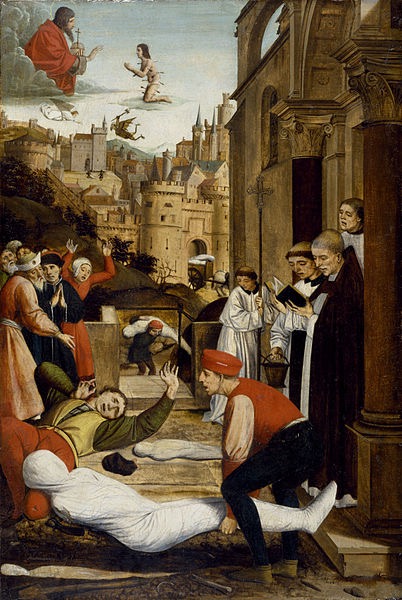
Saint Sebastian Interceding for the Plague Stricken, Josse Lieferinxe (–1508), between 1497 and 1499
Hunker down,
avoid others like The Plague,
the only cure we know so far
involves just staying away.
Talk's cheap.
Life's dear.
Nobody's immune to this damned virus,
no matter what you hear.
Pandemics bring out the crazies, the gullible babies desperately seeking protection. We hear of people too similar to us falling to the infection and understandably get to feeling itchy about its presence. Someone we trust appears to reassure us. We might come to firmly believe that those who fall ill are receiving some sort of payback, retribution for some critical shortcoming. Our news feeds reinforce our previously underlying prejudices, whatever they are, for we seem to run in herds now. If someone insists that only others contract the disease, we breathe a little easier, and might even continue to physically mingle regardless of the governor's latest directive. A pastor, a self-serving politician, a studied pitchman, an old family friend, credentials stemming more from familiarity than from any specific qualification, voices we trust seem to especially empower us. We want to believe, and so we too easily do believe. We hear salvation rumbling through our grapevine and feel protected when we're not.
Whenever chance rules, humans seem to create explanatory stories.
TheProject'sManaging
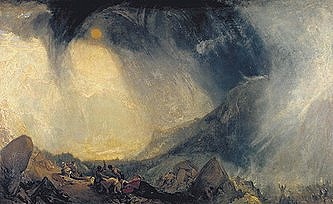
Snow Storm: Hannibal and his Army Crossing the Alps, J.M.W. Turner, 1812.
"The project, like the fates, is always, always, always ultimately in charge …"
Our Administration Incapable of Administering seems to be simultaneously making every single classic project management error, just as if it wasn't standing on the shoulders of millennia of prior experience. This might not be completely their fault, though I wouldn't mind blaming it on them, for nobody's ever written anything like a definitive history of project management to at least outline how it came to be and what it actually entails. Instead, little self-serving fictions written by victors filled in, extolling one or another technique or one or another so-called brilliant man. The result might as well be sold as fiction and certainly provides no clear template for reliably succeeding when managing the achievement of any novel objective. Most certainly, the "profession's" deepest roots lie in military history, for the most ancient novel objectives always involved military campaigns. Several otherwise unremarkable generals have been credited with quipping that no plan ever survives contact with any enemy. They don't generally survive contact with friendlies, either.
Each generation has strived to improve upon each prior generation's so-called practices, always somehow managing to replicate what they first complained about, producing another method that succeeds a little less often than a fair coin toss, raised to religious necessity, filled with Thou Shalts enjoining someone else to be sure and do something those someone elses never have and never would actually do.
SimpleEconomics

Adoration of the Shepherds or the Nativity by Gerard David, 1490
"We covet health now, and a living more ennobling than any capitalist can count."
They were by all accounts humble shepherds, though that designation seems redundant, and not only because nobody's ever filed any report even hinting at the existence of haughty shepherds. Shepherds might find arrogance and self-importance less than useless in the productive execution of their role in society, for their wards are invariably humble and rather stupid, more interested in following each other around and not really in to adoring any charismatic leader. Shepherds were almost always contractors, not sheep owners or full time employees with benefits. They worked through the season in sublime isolation with only the adoration of their sheepdog as company. Yet they were counted as full equals at the nativity, right up there with those angels who had so recently rendered them "sore afraid" and the three wise men. Their contribution appreciated without compensation, for the Nativity, like much of every society, was not an economic activity.
We speak of ourselves as capitalists, though only a relative few of us actually hold much capital.
ToDieFor

Giovanni Battista Tiepolo: Die Unbefleckte Empfängnis (The Immaculate Conception) 1767-1768
" … faunching to go out shopping again, like a genuine Parisian …"
The phrase sounds so seventies to my ear, as if I hadn't heard it in decades, but back in those days, some would actually say that such-and-such (often a cheesecake or a particularly well-marbled steak) was, "ToDieFor." I was sure then that I couldn't quite unwrap the meaning. "Do you really intend to say that tasting this slice of cheesecake would have been worth risking your life for, and that had you not successfully waded through the surrounding mine field, or if a sniper had pegged you on the way in tonight, you would have gladly gone to your maker because you would have died pursuing this perfection? Really?" I never actually engaged in this sort of cross examination, though my mind always raised one skeptical eyebrow whenever subjected to this phrase. ToDieFor? Really?
These days, the phrase's taken on another connotation for me. Under orders to stay at home, my relationship to larder stocking's changing.
Revisiting

"Jeanne Hébuterne au col blanc"
Amedeo Modigliani - huile sur toile - 1919
"Bless every blessed one of us here."
Psychologists used to insist that Revisiting the source of trauma helped resolve the effects of that trauma. More modern practitioners doubt that this was ever the case, and that Revisiting might resurrect strong memories of the experience, but might well amplify rather than mollify its effects. Freud was great for Revisiting, and the old joke about Freudian therapy reported that the typical patient was well on their way to recovery after only thirty years of intense clinical work. Still, a look backwards from a more secure location might provide opportunities to reframe the humiliating experience, but other techniques might allow for the traumatized to reframe the meaning of the experience without dredging up anything like the full past impact of it. I'm all for leaving the past buried, but for my money, I firmly believe that reframing might be the only effective way to change the past, which might be the challenge every traumatized anyone really faces.
The headlines once again scream Recession. Some even threaten Depression. These words hardly overplay the economic situation we all face, some of us much less prepared than others. Many have never experienced such calamity before, and while this current situation might well appear potentially much worse than any past downturn, each person experiences even the most global and far-reaching one, very personally; excruciatingly personally.
Barriers

" … one needs to invent a pencil to fill out the requisition for ordering pencils."
The Muse, The Otter, and I are presently cordoned off after a fashion. A minister in Louisiana hosted a gathering of 150 of his faithful, he insisting that if anyone contracted the dreaded virus, he'd heal them with the Spirit of the Lord. Good Lord! People reacted similarly to the Great Plagues in Europe. People became devout, hoping to at least be buried in consecrated ground, I guess. I'm trying to be more careful than that Senator who might have infected the Republican Caucus. (Notice how I'm not mentioning divine retribution.) The governor of Idaho thinks sheltering in place should be a local decision, encouraging that self-reliant pioneer spirit that killed off a considerable percentage of would-be pioneers. We're still not testing broadly enough to even get a half-decent statistical handle on the pandemic's spread. We count bodies instead.
I might not be quite as careful as I intended to be.
CartoonScientists

The Four Humours, from Deutche Kalendar, 1498
The Four Humours are the essential bodily fluids: Yellow Bile (Choleric), Black Bile (Melancholic), Phlegm (Phlegmatic), and Blood (Sanguine). It was thought that imbalances in these humours led to illness, but that they could be redressed by changing the diet, taking medicine and by undergoing surgery or bloodletting.
" … cider and kosher salt couldn't quite qualify as essential supplies …"
I consider myself to be a CartoonScientist. Not a scientist, I have accumulated a body of understanding based upon some science reading, certainly, but also through exposure to sources as disparate as credential-less self help authors and classic Warner Brothers cartoons. Yes, Wylie Coyote taught me almost everything I know about physics. I think I might have accumulated slightly more reliable understandings than has the mythical average person, but I confirm my scientific beliefs through firm conviction rather than by anything like objective observation. I hold at least one of my thumbs upon every scale, skewing my measurements in what I imagine to be my favor. I maintain my worse habits by essentially giving myself exemptions from any ill effects which might stem directly or indirectly from those habits. I believe myself to be much healthier than average, better fed, and more psychologically mature, just like all the other CartoonScientists surrounding me.
In my lifetime, "science" has confirmed as real many times more phenomena than in all previously recorded history, producing an astoundingly overwhelming body of understanding, the bulk of it utterly lost on me.
GhostTown
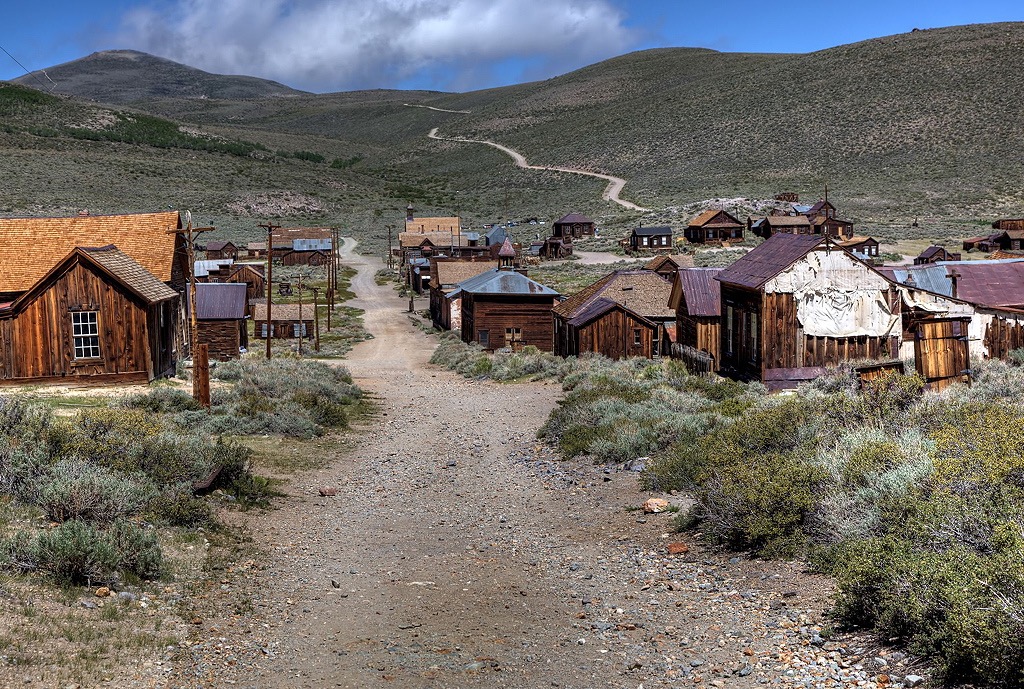
"Who would I have to become to thrive there?"
I drive because there's no place to go. I know nothing's open except inconvenience stores, and they're not really anything like destination resorts. The gas tank's full, milk supply fine. In the old days, I might head for a diner, grab a seat at the counter, and order a double batch of green chile-smothered hash browns while listening to the buzz and bustle surrounding me, having a little human proximity for breakfast. Us geezers are supposed to be up and out early, chasing lost youth or purpose reading our Times, appreciating our waitresses. The diners have closed except for to-gos, and what am I supposed to do, eat in my car? Drive home with styrofoam sweating on the seat beside me? Nobody runs news stands anymore. The drive-thru window at Starbucks sucks. I drive in broad circles as predawn twilight silently slips into day.
I drive to get away from myself, that quiet, sullen voice in my head stops muttering when I'm behind the wheel.
HomeAlone

Hermit Saints Triptych by Hieronymus Bosch, c.1505
"The background bustle could recharge my spirit …"
As a card-carrying introvert, I know alone. I know Alone In A Crowd. It's my natural state! I know the reassurance of bounded solitude, where I can hear the surrounding bustle without experiencing any danger of being run over by it. I understand Watching From Afar, where the whole rest of the world seems to be performing expressly for my entertainment and enlightenment. The Muse will tell you that she's often felt the need to forcefully expel me out into the world because otherwise nothing seems to happen. I can and sometimes even have passed for gregarious. I can work a room, though it burns through my energy like a diesel dually burns through fuel. I've known and come to prefer the pleasures of the solo presence, invisible at my choosing, alone on stage performing for a room of empty strangers. Not, though, sequestered away within an entire society of the sequestered away, I'm coming to know HomeAlone.
I hardly live alone. The Muse is here twenty-four seven since The Lab ordered her stay away and work from home. TheGrandOtter's here, too, though she keeps New Zealand hours, turning off her light about the time I get up in the morning.
AssEptness
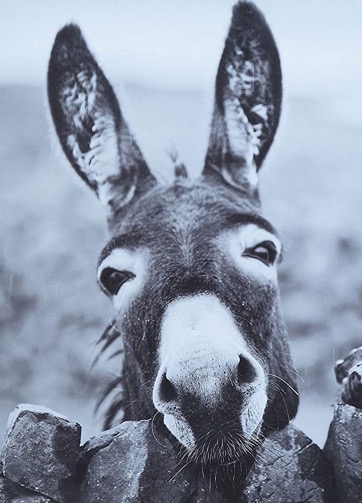
"I could be that vector I've been watchful for …"
I secretly hoped that enlightenment, should it ever deign to visit me, might arrive wearing a diaphanous robe and an ethereal countenance. Certainly some of my insights have arrived like cuddly little angels, but I'm coming to a nigh-on-to certain conclusion that my enlightenment will most likely arrive with all the pomp and splendor of a horse's ass. Not to denigrate the velvety curves of the equine behind, but that particular bit of anatomy has long been more closely associated with utter foolishness than with great wisdom. I understand that Jesus, when not hoofing it himself, often rode into a new town astride an ass, a common conveyance in those times. In these more modern times, I seem to most often enter new territories as the ass itself, not astride one. A donkey's cleverness extends to almost invisibly traversing narrow trails and sometimes exhibiting serious stubbornness, but I'd never imagined that my greatest contribution to this world might be similarly cast. I prefer the narrow, rarely traveled routes and I'm coming to accept that I can be just as stubborn as any disgruntled pack animal. I exhibit what I'll label AssEptness.
For me, acceptance almost always follows a lengthy period of stubborn refusal, during the later parts of which, my heels too-well dug in, I demonstrate well enough for even me to catch just what an ass I've been.
First PureSchmaltz Friday
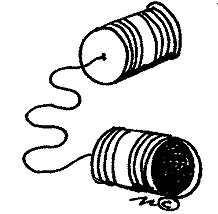
When: Friday, March 20 at 11am MDT (1700 UTC)
Where: https://zoom.us/j/3019315733
(Please note that this link will connect you with David Schmaltz's Personal Zoom Account. The muse added me as a valid co-user this morning.) (03202020)
The web browser client will download automatically when you start or join your first Zoom meeting, and is also available for manual download here. Download Version 4.6.7 (18176.0301)
This meeting will be the first convened video chat with people who have accepted my invitation to join my PureSchmaltz Facebook Group. What will we do? We'll chat, which means that nobody will attempt to sell anyone anything or stress out trying to convince anyone of anything. I will begin by making some provocative proclamation. Following that, we'll see where the resulting dialogue leads us.
AnotherBeginning
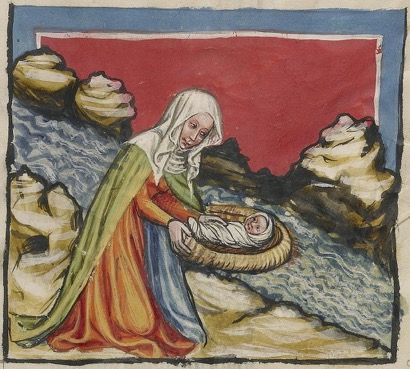
Moses Placed in the River (detail), from World Chronicle (text in German),
Germany (Regensburg), about 1400–1410, artist unknown;
author, Rudolf von Ems.
The J. Paul Getty Museum
"Moses has been placed into the river."
I think of stories as having a beginning followed by a middle followed by an end, though most don't seem to flow that way. Stories most often feature a beginning followed by a middle which is then followed by AnotherBeginning, more Möbius Strip-like than linear, multi-dimensional and circular. Each homecoming hints at another impending adventure. Even happily ever after suggests ongoing activity, not represented by detailed description but by more general inference. Even the most finite-seeming story leaves unanswered questions which suggest more than described. I'd conclude that every ending is AnotherBeginning, but there's no clear ending in sight. Perhaps consequently, I seem perfectly capable of identifying endings. 911 seemed to delineate the end of an era which I might have chosen to grieve over as if I'd lost my innocence. It also seemed to delineate AnotherBeginning, too, though, within which I might choose to divorce myself from my past. It was, of course, both and neither, my choice, my characterization which made it one or the other or both. Both beginnings and endings seem inescapably arbitrary.
This series of stories also begins arbitrarily, on the morning of the first day of Spring 2020, a day rather near the beginning of the Covid-19 Pandemic, an event which only recently swept into prominence.


